#promises vs morals
Text
sometimes i just think about mass effect and how the worldbuilding is so rich and explores complex ideas and philosophies so well--just like good sci-fi does--and i think about how lots of people don’t know about it just because they aren’t into video games and it makes me upset because these aren’t just good games they’re good stories
#mass effect#the geth vs the quarians? genius#the genophage? amazing way to explore serious moral philosophy#i was honestly considering synthesis at the end of the game#but then i thought no so many people died to get me here i have to do what i promised#because i don't just represent myself i represent them and their wishes#like i had an honest-to-goodness emotional reaction to the decision#even though i knew the final decision was basically an instagram filter lol
20 notes
·
View notes
Text
Inda shook his head. “I won’t.”
Tanrid took a step toward him, mouth thin, eyes dangerous. “It’s our honor at stake.”
“Honor,” Inda croaked, “requires me to stand to the truth. Dogpiss died.” He gulped on a sob. “And it was not. My. Fault. I. Will. Not. Take. The. Blame.”
...
“...Yet. I promise you, Inda, on my honor, on my soul, you will get justice.” ... Sponge’s arms closed round him, and held him, in compassionate, loving silence while he slept.
- Inda, book 1
“Yes.” Inda’s voice was so low, and tired. “Yes, Evred, I’ll stand up against the wall. Or if you’re going to flay me at the post, then do it. I won’t argue. I know what I did. Please. Just do it.”
“I do not want to do it,” Evred retorted with barely suppressed violence.
- Treason’s Shore, book 4
#YESSSSSSSSSS I LOVE CIRCULAR NARRATION I LOVE WHEN CHARACTERS END UP WHERE THEY BEGAN !#BITES AND CHOMPS STICKS TO BLOODY SPLINTERS YEAH#50 strokes with a willow wand versus being flayed to death#one 11yo boy's accidental death during the summer games vs direct treason to the king in refusing to go to war (preventing loss of lives)#sponge powerless promising justice as he cradles inda gently vs evred a martial king unable to stop images of yvana-vayir's flaying with ind#inda's face instead#11yo inda barely understanding the whys but knowing he's gotta stick to his convictions vs older inda STILL sticking to those convictions of#moral truth and right over law politics and convenience but THIS time not putting up a fight for himself#all the people. all the friends he's lost over the years due to violence greed politics and war#dogpiss. tanrid. rig. dun. noddy. hawkeye. all the pirates in ship battles and marlovans in the andahi pass#they all died but inda survived and now he doesn't want it anymore#he'll take the flaying over exile he's Done#;-;#inda quartet#sartorias-deles#it's the good shit
7 notes
·
View notes
Text
Hi, hello, yes, I only just now realized that Boston and New York are four hours apart, because I spent college in a town two hours from each and forgot that I was in the middle of the two cities so no it would not take the same amount of time to travel from my college town to Boston as it would take to travel from NYC to Boston. So for more than a year I’ve been thinking two hours isn’t so bad if you need to travel between the two to, say, see your boyfriend who’s never living anywhere other than New York City for reasons(TM). Two hours means day trips are doable if that’s all you can fit in. But now I know it’s four hours??? Not two?? And yes my world has shifted.
Again: More than a year not realizing this. Someone please take away my college degree and JD.
#two hours vs four hours may not feel like a lot#but for the east coast it is I promise#anyway moral of the story is I'm an idiot thank you#we'll thank tonight's writing session for this realization#yes this is about peter and mj#literally the shock on my face when I googled 'boston to NYC' just to double check it was two hours and not 2.5
0 notes
Text
saying F U to the regime again and again: a quick update on women vs IR regime
Famous Iranian actresses have been appearing in public without a mandatory hijab. This has been happening since the beginning of the protests. Last month, Kiumars Pourahmad, a well known Iranian screenwriter and director, committed suicide. He had a history of criticizing the regime's political decisions. At his funeral, some of the famous actresses attended without mandatory hijab.
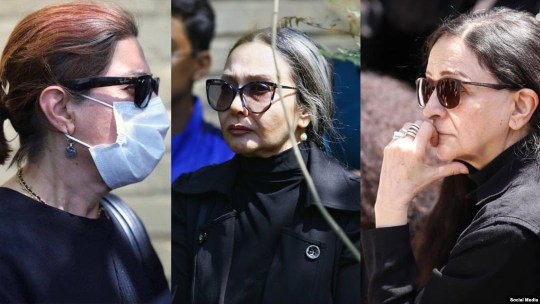
You can see Fateme Motamedarya, Katayoun Riyahi, and Golab Adineh in these pictures from the funeral. Ms. Riyahi was one of the first celebrities who took her hijab off at the start of the Jina (Mahsa) Amini protest and for that she's been the target of IRGC harassment and has been to court.
Last week, in the ceremony of screening of the final episode of Lion's Skin (a persian crime show), actress Pantea Bahram participated without hijab. The manager of Tehran’s Lotus Cinema, where the ceremony was held, was fired for letting her attend without hijab.
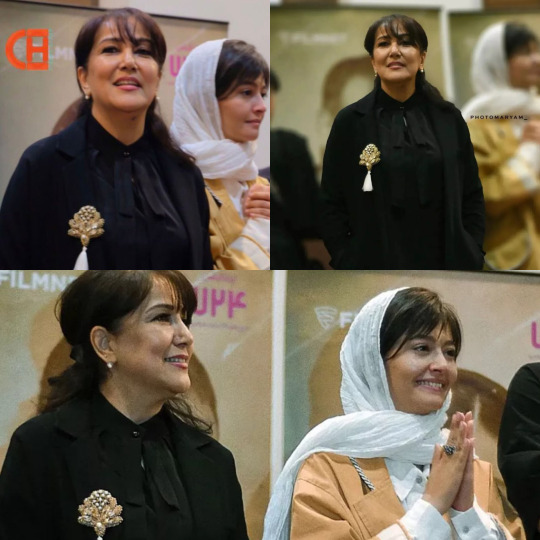
Other than prosecution, the regime has blocked these celebrities' bank accounts. Basij and IRGC members have also attacked and harassed these women online and in real life.
Students on university campuses take off their hijabs. There's an installed version of morality police in universities that monitor students' styles. Female students must wear "appropriate" hijab and male students must wear "manly" clothes (one of my guy friends once was asked to go back home and change his shoes because they were red casual loafers. Apparently that's gay!). When you enroll in Iranian universities, the first thing you do is to go to the security office and sign an agreement that says you promise to follow the Islamic dress code. There are posters all over the campus that says things like "hijab is security" "respect the islamic hijab" and "not wearing appropriate hijab (tight short clothes, too much hair, makeup, etc) would result in legal action". So not wearing hijab on campus, where a lot of security cameras are installed and it's easy to identify you, is a big deal.
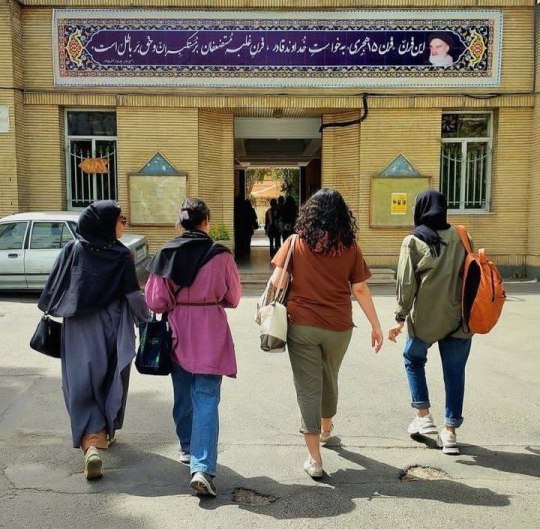
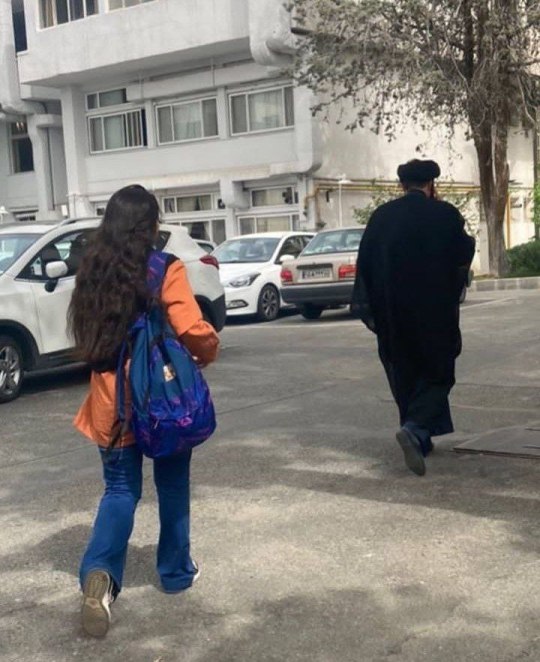
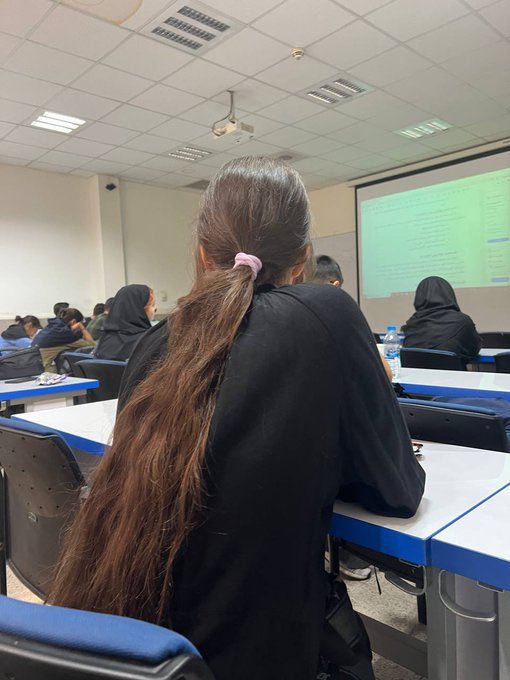
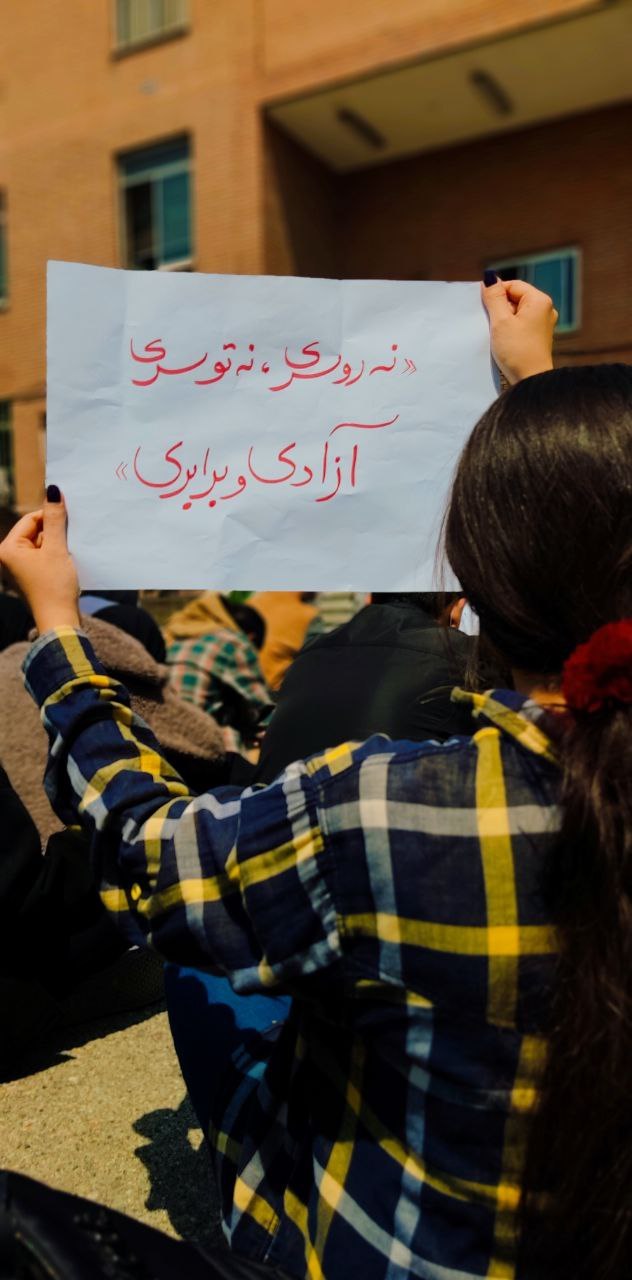
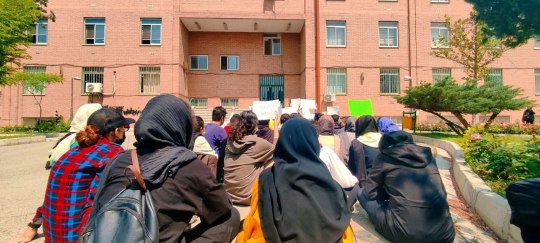
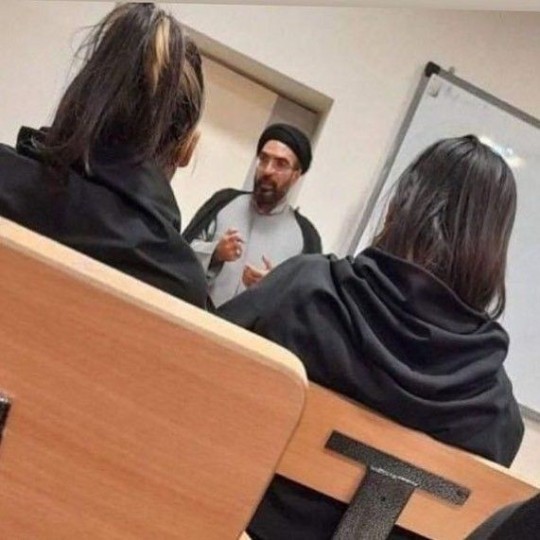
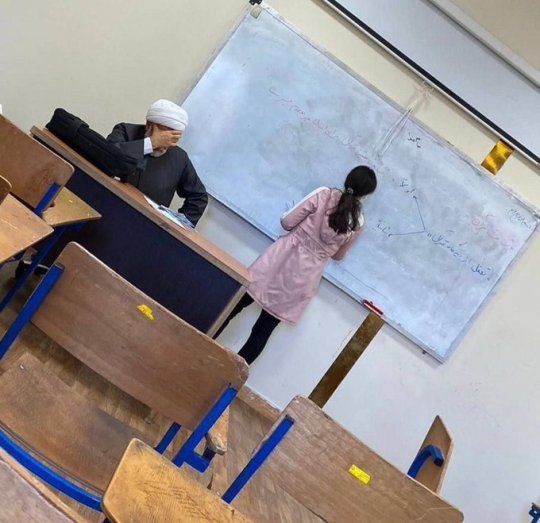
The regime's response to students taking off their hijabs is sending threatening messages to students' phones and increasing the security people. At the entrance of Universities, these security forces check people's clothes and if it's not proper they won't let you in. Some of the students wear the hijab at the entrance and take it off after they're in. They have warned our professors to not let non hijabi students sit in classes too.
One of my favorite trends in Iran now is when guys wear our hijab. These pictures are from universities. Guys wearing hijab make the security mad. This is a great act of solidarity with women against the obligatory hijab.
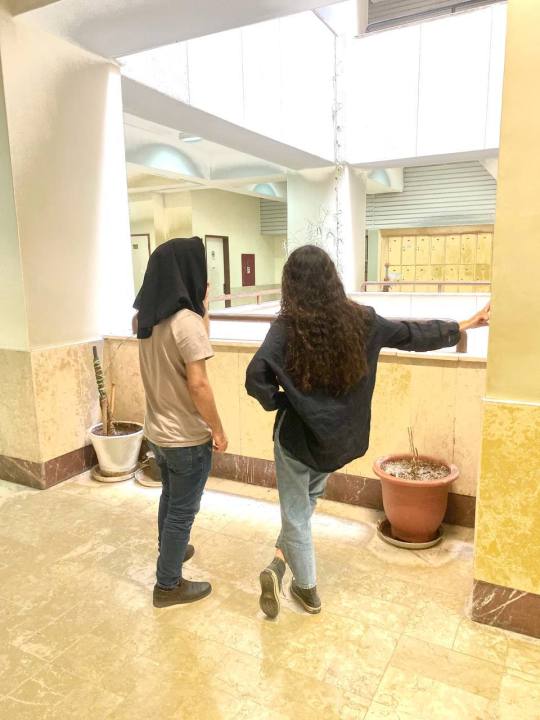
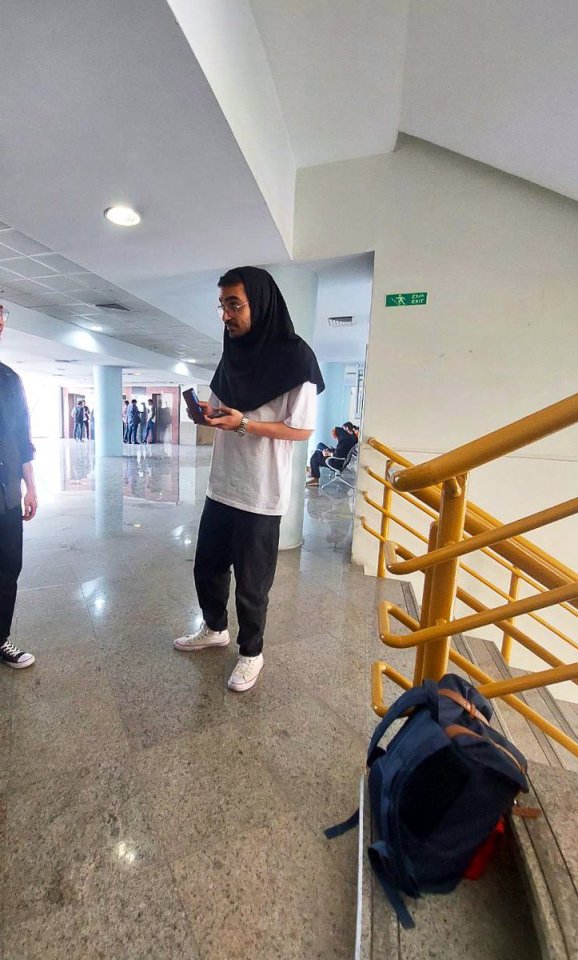
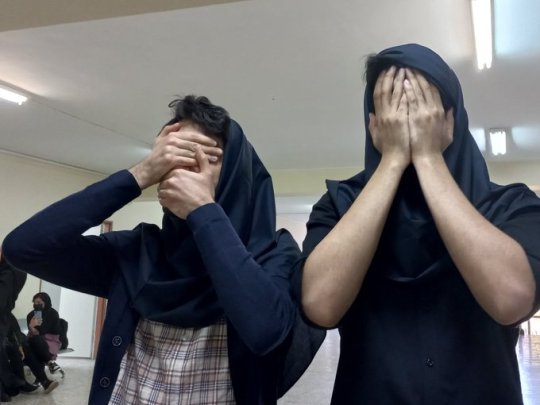
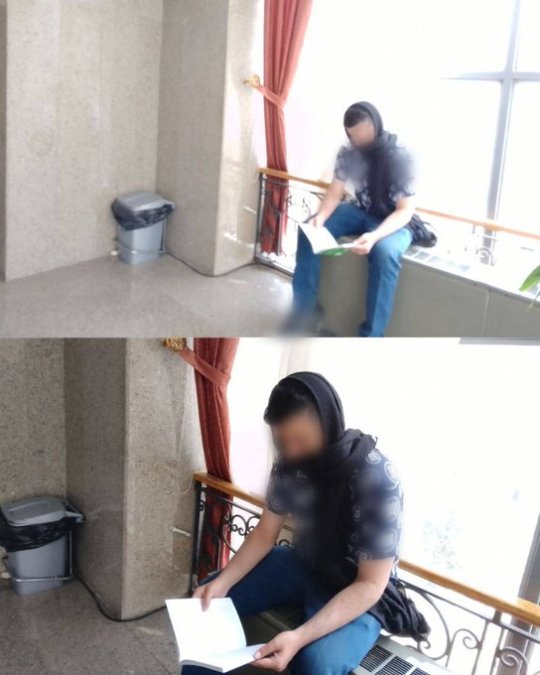
Some men have been doing either this or wearing shorts in public. The former is to ridicule the obligatory dress code and the latter is because wearing shorts in public is forbidden for guys too.
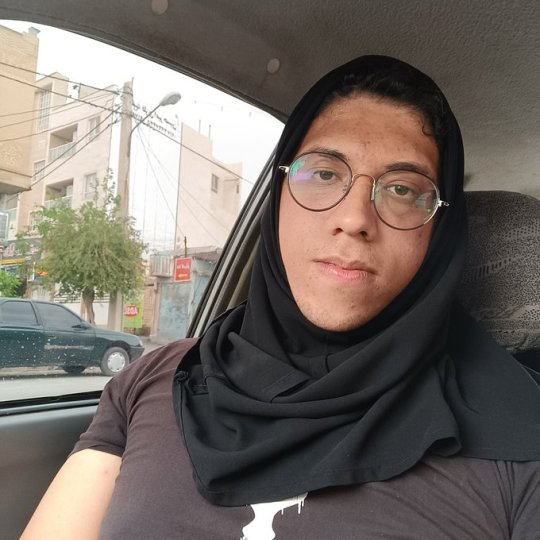
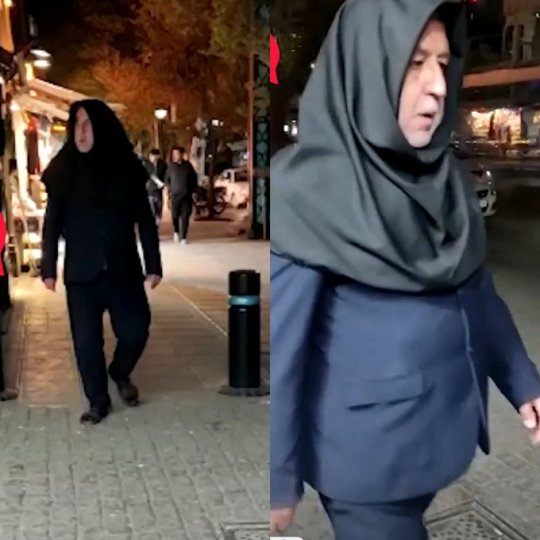
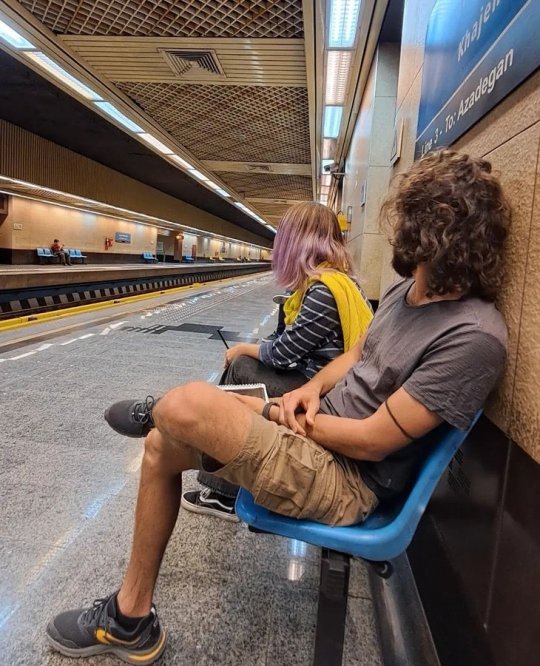
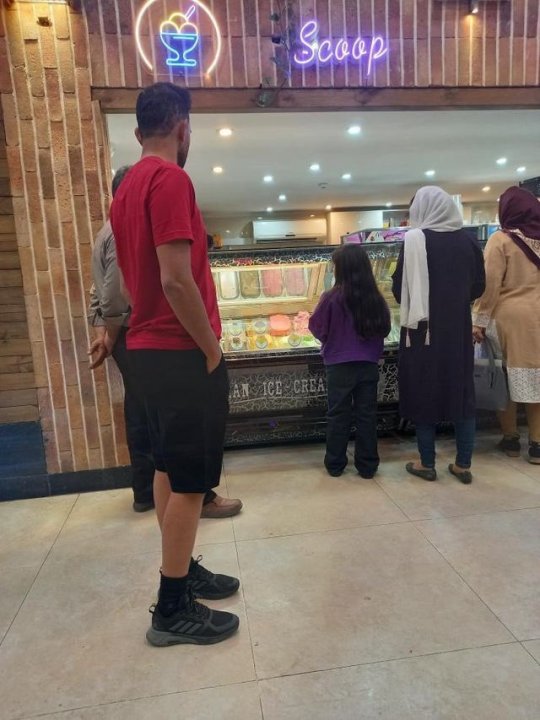
And women not wearing hijab in general. Though hijab is not our only issue, we want a whole new political system, one that is not theocratic or terroristic, hijab is something the regime won't back down from because it's one of their strongest oppressing tools. If they let us win the fight against obligatory hijab, I quote from a regime head, "people keep demanding more changes"!
So to put people against people to enforce the hijab law again, the regime has closed down many businesses (hotels, cafes, malls, bookstores, etc) for welcoming non hijabi female costumers. They have also warned taxi and bus drivers to not let non hijabi women in their vehicles.
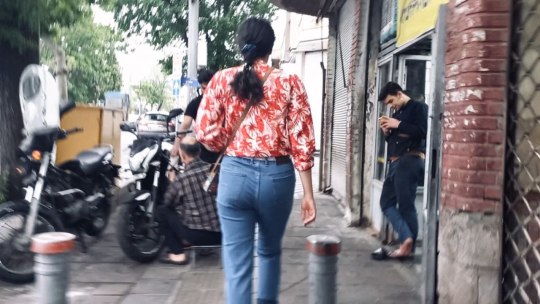
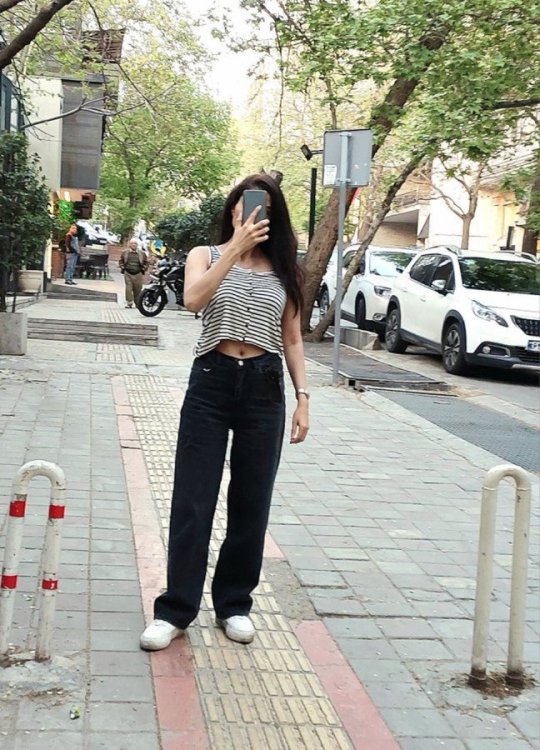
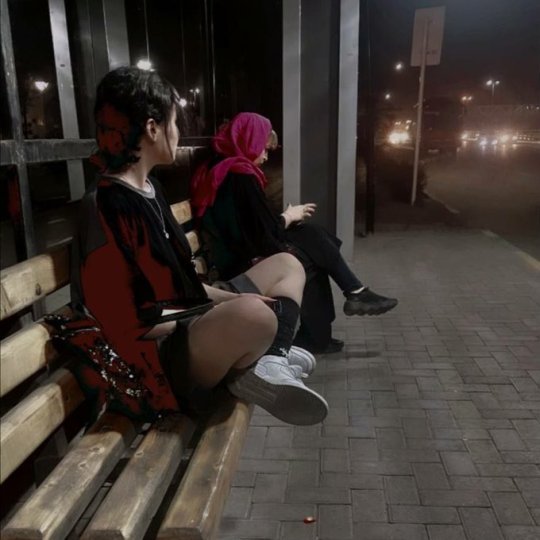

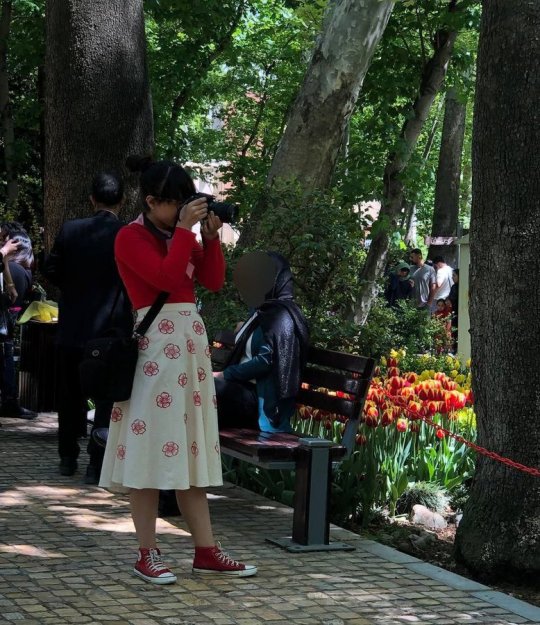

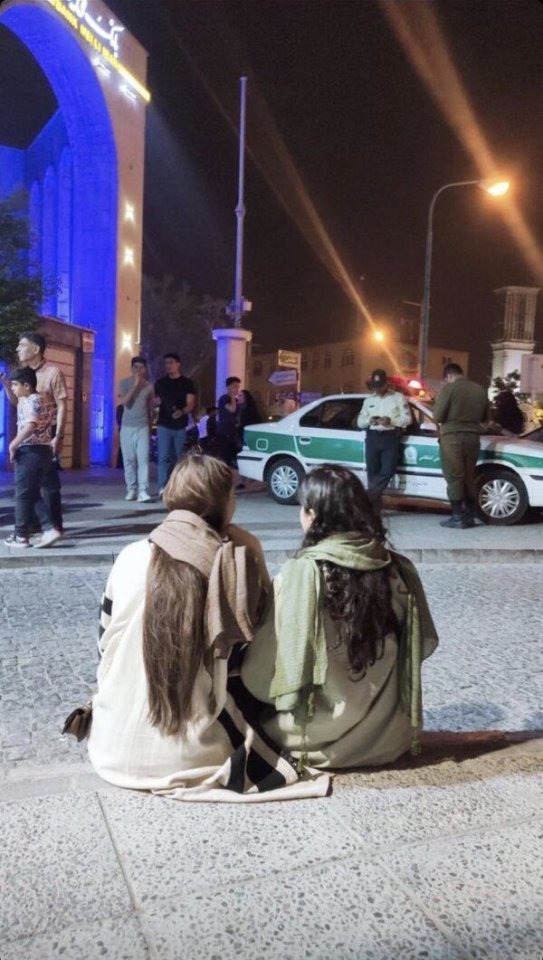
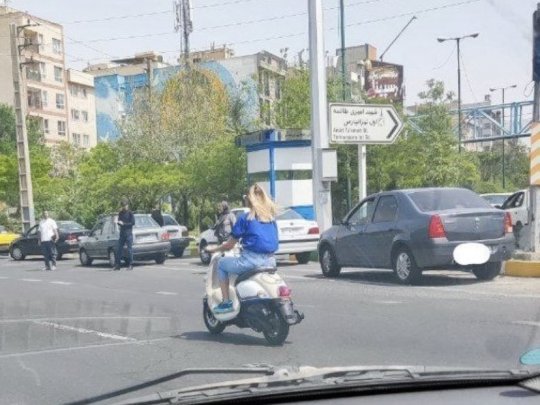
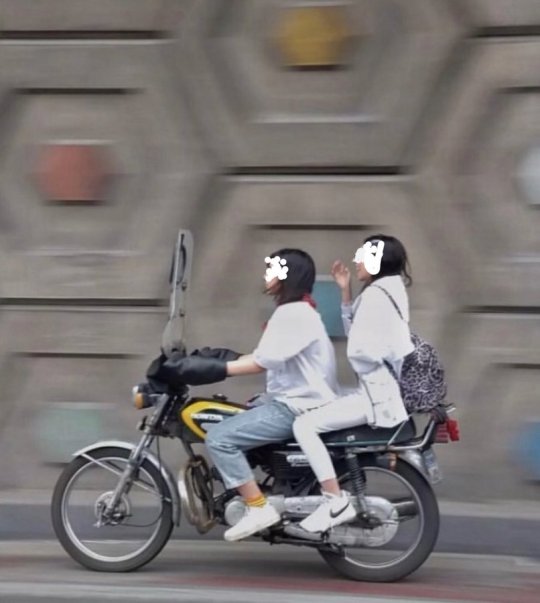
Although not everyone is disobeying the hijab law (some believe in hijab, some don't want to pay the price), the number of women who take the risk and don't wear hijab in Tehran and many other cities is high enough that you feel encouraged to keep doing it.
#iran#iran protests#iran revolution#mahsa amini#jina amini#jin jiyan azadi#women life freedom#politics#human rights#feminism#middle east#women revolution#obligatory hijab#university student#civil disobedience
2K notes
·
View notes
Text
Aries - Libra Axis: Tells a story about taking action vs. indecision, inaction, and procrastination. Tells a story about selfishness but also giving to the detriment of self, lack of boundaries, assertion, charm, persuasion, force, peace and war, leadership and cooperation, independence vs. partnerships, passion, romance, self-awareness vs. shallowness and detachment, insensitivity vs. tact, cheating and deception, winning and losing, honesty and bravery. Tells a story about lovers and fighters.
Taurus - Scorpio Axis: Tells a story about control, power, jealousy, resentment, stubbornness, indulgence and sensuality, comfort and thrill, safety and danger, possessive behavior, materialism, emotional strength and influence, inner security or contentment and inner empowerment and passion, willpower, revenge, grudges, manipulation, obsession, seduction, self-destruction, transformation and rebuilding. Tells a story about self-mastery and self-esteem.
Gemini - Sagittarius Axis: Tells a story about communication, learning, knowledge, teaching, exploration of mind, body, and the world, trickery, con artists, betrayal, support, lies and truth, versatility, duality, variety, curiosity, superficiality vs. depth, philosophy, morals, logic, spontaneity and fickleness, symmetry vs. asymmetry, restlessness, carelessness, freedom, exaggeration vs. factual, movement, cunning wit and intellect as well as wisdom, optimism vs. skepticism, dissembling, analyzing, deception, schemes, gossip, boasting, charm vs. tactlessness, and promises. Tells a story about storytelling - lessons and adaptation.
Cancer - Capricorn Axis: Tells a story about protection, self-preservation, endurance, practicality, emotions and rationality, defense vs. offense, vulnerability, attachment, clinging vs. self-reliance, sentiment, nostalgia, home and family, ambition, purpose, clans, tribes, societies, private world vs. external/outer world, moods, cycles, authority, parents/mothers and fathers, caution, responsibility, duty, patience, compassion vs. cruelty, intuition, shrewdness, strategy, contentment vs. dissatisfaction, security vs. insecurity. Tells a story about needs and being uninhibited, as well as control and discipline.
Leo - Aquarius Axis: Tells a story about leadership, charisma, confidence, individuality, self-expression, creativity, innovation, the power of one vs. the power of the many, attention, compulsion, pride, ego, play and discovery, experimentation and rebellion, drama, curiosity, socialization, influence, dignity, generosity, benevolence and/or common good, chaos, destruction, passion vs. dispassion, humanity, divinity, fellowship, organized groups, separation or standing apart, control or tyranny, strangeness and what's rejected vs. what's accepted or even celebrated. Tells a story about the king/queen/politician and anarchist/rebellion/revolutionist.
Virgo - Pisces Axis: Tells a story about the spirit and body, healing, helping others, service, caring for others, listening to your body or your intuition, purity vs. corruption, compassion, sensitivity, impressions, flexibility, logic, imagination, being receptive, mysticism, confusion, illusions, clarity, distillation, categorizing, researching, analyzing - a thorough search for facts/truth. Tells a story about sacrifice, empathy, saving others, discernment, efficiency and productivity vs. procrastination and rest, modesty, free and flowing energy vs. precise and predictable energy, perfectionism vs. admiring flaws, realism or skepticism vs. idealism, details vs. big picture. Tells a story about the dreamer and the worker, the ability to make our dreams come true.
#zodiac#astrology#zodiac signs#polar opposites#aries#taurus#gemini#cancer#leo#virgo#libra#scorpio#sagittarius#capricorn#aquarius#pisces
358 notes
·
View notes
Text
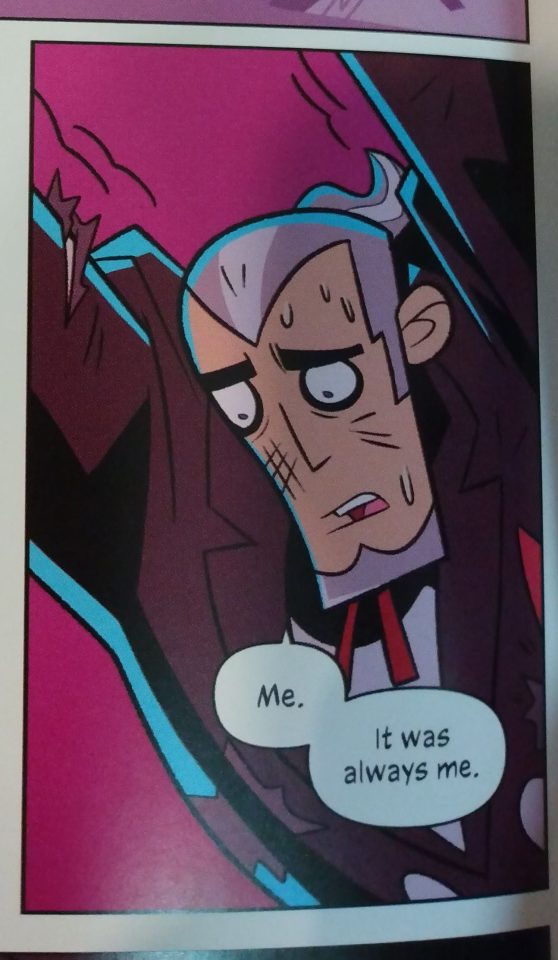
Okay, cool. I can finally talk about the absolute catharsis I felt after fifteen years hoping - dreaming - of this moment because holy SHIT, they did it. They goddamn DID IT.
VLAD GOT HIS REDEMPTION ARC.
Let's talk about it...
By the end of the third season, Vlad Masters had ostracized the entire planet by exposing his true self (why), demanding money and total command of Earth, and completely wailing on Jack Fenton, driving away the only member of that family who unequivocally adored the man where every other Fenton knew him for who he truly was: utterly despicable and incapable of seeing the bigger picture.
Because, after all, he is a villain and that's just what villains do. Villains want power. Villains want to rule the world. There need not be more than that, and in another show, there wouldn't have to be. As far as Hartman was concerned, there is only a binary Good vs. Evil.
You would be hard-pressed to view the Vlad in "Phantom Planet" as the same man who anguished in desperate madness when his perfect clone son died in his arms. That was a Vlad who, by that point, had taken his biggest gamble and lost. I guess one could see his reasoning in season three as a "fuck it all, what even is the point" mode. But while "Eye For an Eye" (tellingly, the last major script helm by former main story writer Steve Marmel... just saying) promised a personal conflict, by the end of the show, he's made it much more external, far greater than what he and Danny's interwoven plot originally started off as.
Vlad is pathetic. Vlad is narcissistic. He is egotistical, entitled; a bitter, arrogant man who lives in his dream castle with all the money and privilege in the world that would leave him content a hundred times over, and it's still not enough.
Money is not Maddie Fenton, the woman he loves. Money is not Jazz, a child that should have been his. Money is not Jack's friendship whom he denies severely, the only part of his life who willingly embraces him. And money is not Danny, who is a half-ghost like him, and by all rights, should have been his son.
No one else could ever understand to the fullest extent of their uniqueness than Vlad and Danny would to each other, and the latter, for the longest time, hated that. Hated the way Vlad talked down to him and manipulated him, hated the whispers into his ears with promises of grand power if he just joined the billionaire's side and become his ward, hated when he caved in just once in front of Vlad's eyes who responded with a smug "See, I know you" reaction. Danny was fortunate to have good moral compasses from his family and friends, but the thing is, though, it's not about the healthy support structure he had, because Vlad had the chance to get some, too. Jack and Maddie loved Danny no matter what he was, and dollars to donuts, they would have for Vlad if the latter had approached them with his problems.
But he chose instead to be bitter and miserable, taking it out on everyone and expecting them to fall into his train of thought. The show knew what he did was wrong, but until season three, never stopped repeating his truest desire: to find love and squash his crushing loneliness.
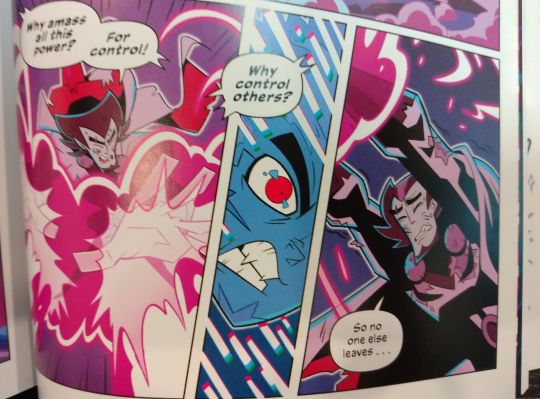
Hartman couldn't provide a damn on what exactly was Vlad's "destiny" in "Infinite Realm"; it was vague gesturing to excuse his villainy. He was more than happy to abandon the life he's made for himself and the woman he loved in spite of two decades of planning, all on a whim for whatever time period the Infi-map was willing to take him, hoping maybe this one will give him the unconditional worship that he thinks he's deserved (by force, of course.)
Because he's the villain.
And for the longest time, the show ended with the idea that Vlad deserved to be stranded, away from people, because he simply could not help himself. To be fair, there is a lesson in that - some people genuinely DO go so far that there really is nothing more we can do other than stop the problem before they cause any further harm. I'm not denouncing that.
What I AM denouncing is the the narrative plant that's dug its way into the greater plot where an older Vlad in "The Ultimate Enemy", realized what a fool he had been. What he wouldn't give to start all over and be a better person. You don't just give someone a sympathetic goal like "looking for love", constantly provide the necessary stepping stones, and not have it set up for something far more substantial than what we got.
And even then, even if it still ended with Vlad being too far gone, I wonder, should the supposedly original plot arc for season three had been made, would Vlad's fate there been far more appropriate than whatever cartoonish supervillainy he ended up as by the time "Phantom Planet" ended?
I cannot speak for Gabriela Epstein. I cannot say how much Nickelodeon allowed her to tinker with the DP world. All of this is presumptuous speculation on my part, but this entire comic feels like they looked at season three, particularly "Phantom Planet", realized what a travesty that was, had their work cut out for it, and went about to make a post-series finale story that still paid tribute to its ending while wiping it off the map.
Vlad's redemption is the crux.
Within just a few panels, Gabriela Epstein provided an explanation on the why of Vlad's actions circa-season three. The Infi-Map was aimless because Vlad's purpose was aimless. And Vlad's purpose was aimless because his need to be in control was a manifestation of his greatest fear: being alone.
"A Glitch in Time" recontexualizes why Vlad traveled across time in "Infinite Realm." It wasn't a generic bad-guy-wants-to-rule-the-world-through-latest-plot-claptrap, but an act of utter desperation from a man who had since lost the biggest connection to his very being: Danny.
It started with Maddie (someone whom Vlad only interacts once in the comic, but is an acknowledgement of his villainous origin, nonetheless), and it may still end with Danny.

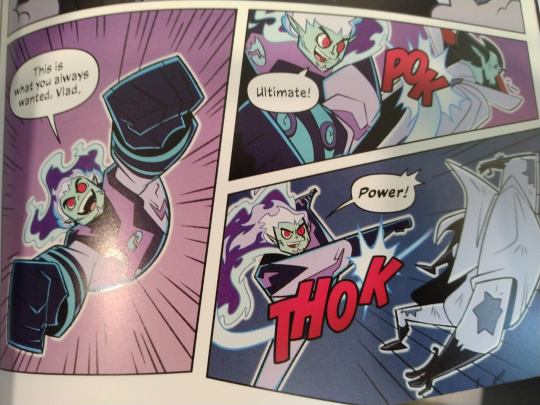
Never, in a million, billion years, have I even thought about another redemption arc... for Dark Danny.
And I am kicking myself for not even considering such an option. I had pegged him so far gone, so far past the breaking point to think otherwise. Dark Danny was suppose to be the outcome of a Danny at his literal worst: a too-late, too-little scenario. Back then, it was a symbol of Danny's rejection of what Vlad expected and desired of him.
But the comic made me sit down and think about the implication of Dark Danny's very existence, that of a man who lost his family and friends ten years ago as a child. Like Vlad, he, too was alone, and had carried a tremendous amount of pain and anguish that his human half just could not bear.
Yeah, they died because of a time loop HE created, but that doesn't erase that he was born from a horrible trauma that he could not properly cope with. And Vlad, try as he might, did not fix it. All he ended up doing was separate a ghost - infamous for their obsessions, and now, as the comic established, a carrier of human emotions - to exist. And Dark Danny carried so much raw emotion that he retaliated very, very violently.
Everyone's respond at that time was to fight him and stuff him in a Fenton Thermos for eternity. I am not saying Danny wasn't justified in fighting his darker self because the dude legitimately caused massive damage and likely murdered a hell of a lot of people, I am just saying Dark Danny is the byproduct of a scared, lonely, traumatized child.
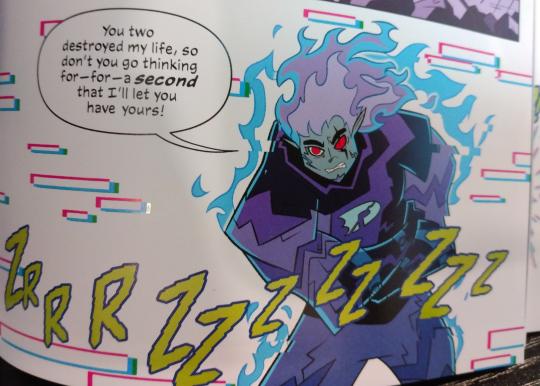
And what does he do? He tries to take what he thinks is his by any means necessary. Vlad got his wish, he got the son he wanted.
And he's facing him now.
And he gets it.
He finally fucking GETS IT.
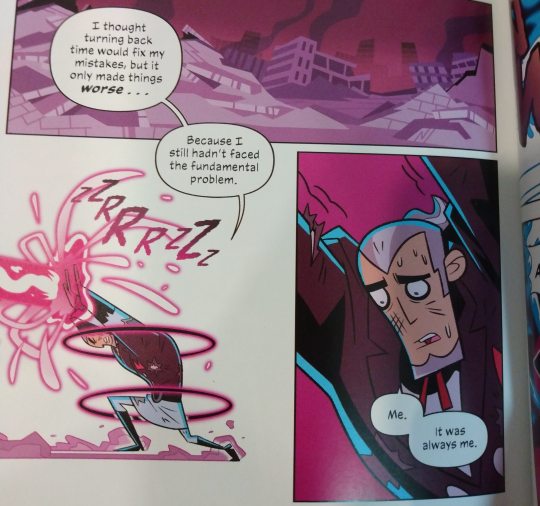

Which shouldn't have been a surprise because his "The Ultimate Enemy" counterpart got it. He looked at the devil that he created and lingered as a hermit in regret. And now Vlad - Vlad Prime - reacted the same.
Only this time, he can fix it.

I did not anticipate that Vlad's redemption would happen at the same time as Dark Danny's. I didn't expect the two of them to link other than the latter being another number in Vlad's bullshit entitlement count.
I love that it isn't Danny who heals him, but Vlad. It had to be Vlad. In order to own up to his actions, Vlad had to look at the eyes of the boy he was entrusted and corrupted beforehand and apologize for what he put him through. And I don't mean just "The Ultimate Enemy", Vlad is apologizing for everything he's done up to this point.
He (temporarily) sacrifices his body to stabilize Dark Danny who has fucked up the time stream so much that he wouldn't be able to exist otherwise. And only then do the two of them get what they've longed for.
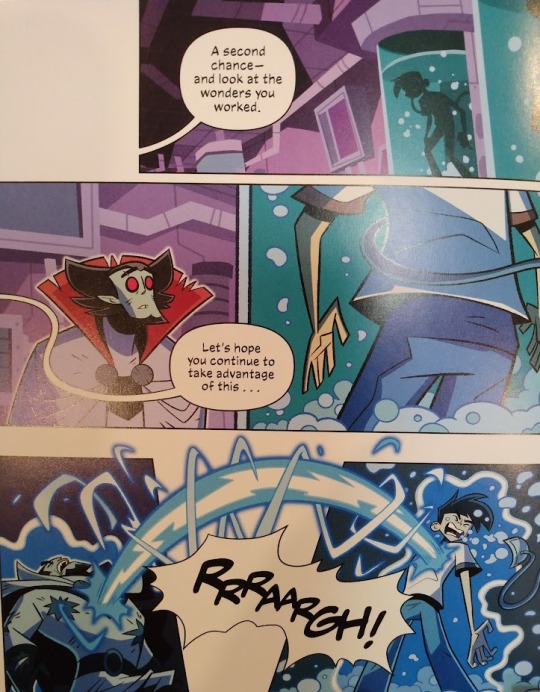
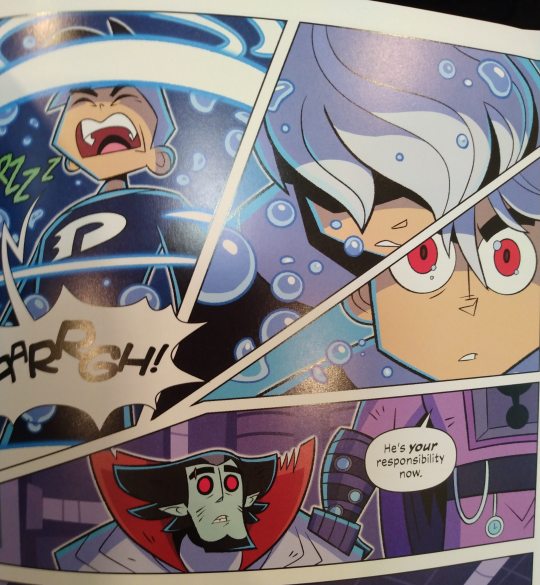
Vlad gets a son.
Dark Danny gets a family.
Holy forking shirt balls.
I have a lot of problems with alternate counterparts sticking around longer than they should in the "main" setting of a show. Usually I'm fine when it's an alternate counterpart demonstrated as someone the hero is trying so hard not to be, because it's compelling to see what could have been under different circumstances. It's another thing when you have another version of the main character running around doing their own thing. Multiverse characters are inherently messy just by existing, but it gets worse when they take away from the uniqueness of the central protagonist.
There's something awkward about two Danny Phantoms living in the same world, and in any other scenario, I would have hated it. But Dark Danny is of a vastly different background brought forth from a long, nuanced, engaging history between him and Vlad.
Danny's central journey - the cusp of the show - has always been the Spider-Man mantra, "great powers = great responsibilities." You are in charge of how you carry the burden of your powers. Vlad has been the one constant always challenging and belittling his selflessness. "A Glitch in Time" had Danny asking himself, what is his purpose? Who is he now that everything has been neatly wrapped up?
Writing anything about who Danny is means Vlad is presented in some way, shape, or form. They are so thoroughly linked to each other, and it's that link that simultaneously serve to push their own individual character arc, and their relationship with each other.
So, Vlad gets a son. Dark Danny gets a family. They get a second chance, and it is up to them to work it out. I have no idea if Vlad got his wealth back. Everything is restored as is, except Danny's secret identity is secured again (which I am 100% fine with except for one notable exception, but that's another topic for another day) and implication that Vlad was just a crummy mayor with no indication the greater public is also aware of his Plasimus mode (which I am also fine with.)
There's a part of me who thinks he should have lost the money and power he's accumulated because he gained them through his vice, but if he's back in his Wisconsin cheese castle, then he can damn well use the money he has to not only benefit the world (charities, improving human lives, funding Fenton Works ;D...), but to raise his son.
Dark Danny is going to have to adjust to the idea that his father is Vlad, something he was already expected to do so when he orphaned himself and moved in with him. But it's Vlad who has to work the most out of the two: as a parental figure - as an adult - he's always had a power over Danny regardless of what timeline they're in. Most of the time, he's abused it heavily.
The second chance Vlad has been given here means he has the ability to provide a safe, healthy environment. It's more than he deserves. He failed with Danny and he absolutely failed with Dani (another can of worms in itself; she's not mentioned in the comic, and I imagine it's because her story would need a comic of her own), he cannot fail with this Danny.
Vlad shouldn't have been given a child at all until there was a guarantee that he could work through his bullshit, but Dark Danny is a special case. He is a kid who needs a home and someone to love him unconditionally, and Vlad needs to learn boundaries while giving selfless love in order to be loved himself.
Clockwork gave Vlad a test, so get studying, dude.

This does not erase how Danny Prime feels about him. He may never want to forgive Vlad, and that's his right. He can acknowledge however, that, in order to help those in need of healing, a door can be opened, even if slightly ajar.
For Vlad, that may just take a bit longer and that's completely understandable.
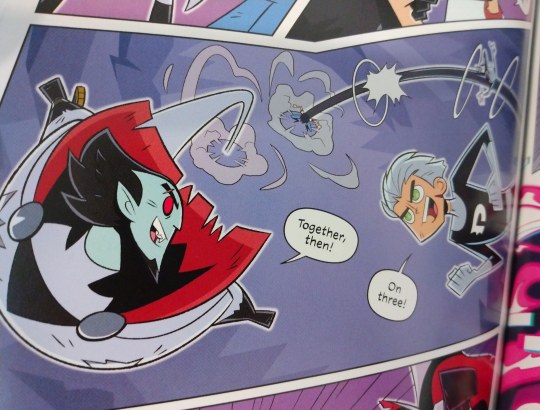
Vlad can't have the kind of relationship he wants with this Danny, but maybe one day, they can be equals - friends.
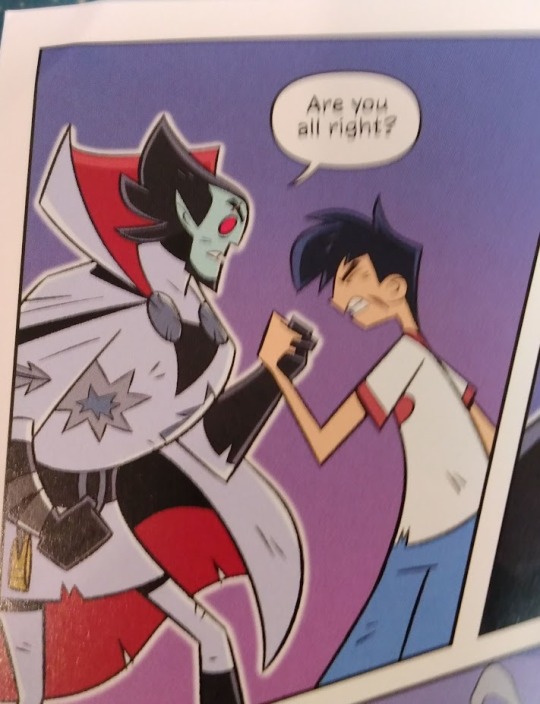
Like christ, I think this is the first time Vlad has actually, genuinely asked if Danny was alright.
The comic was already good prior to this, but just knowing - understanding that Vlad was more than "a villain" - meant after fifteen looooong years, we finally see the promises of a brighter future for a man with shitty priorities, but a sympathetic goal.
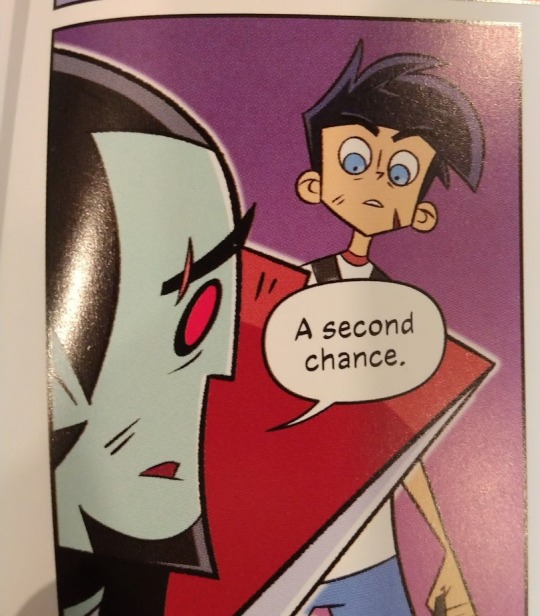
"It's over, isn't it?
It's over, isn't it?
It's over, isn't it..."
#danny phantom#vlad masters#neoyi talks#comics#a glitch in time#a glitch in time spoilers#yeah this one im tagging#this essay is over a 1000 words it's pathetic
750 notes
·
View notes
Text
There is something skittering around in my brain tonight about the way that BG3 intends the audience to view mind flayers as individuals vs as a species, and the way that plays out in the player's relationships with Omeluum and the Emperor.
I mean, one of the primary gears upon which the story turns is that when a person becomes illithid, the soul they previously had is destroyed (but not their memories of the person they were). This is presented as an insurmountable wrong - literally socially aberrant - and it certainly is so from both the point of view of the gods concerned with mortal souls, and illithids' mortal prey concerned with keeping their brains in their heads.
The Emperor's storyline takes this to the conclusion that the condition of being soulless is, in and of itself, a complete destruction of the individual; that whatever it was before, the illithid will be invariably manipulative, inherently untrustworthy, and unable to reconcile its needs and desires into peaceful coexistence with non-illithids. It's certainly the conclusion you're intended to draw from Duke Stelmane's story, as well as numerous supporting texts, most notably from the creche.
But then... Omeluum offers the refutation to that. Here he is, leading a peaceful life because he just... wants to. Absent a soul or comprehensible mortal desires to operate as a moral compass, Omeluum still chooses to contribute to the Society of Brilliance. He voluntarily and at personal cost researches alternative food for himself so that he doesn't need to feed on sentient beings. He helps the player character multiple times, despite the fact that doing so carries variable risk with little promise of reward.
So clearly, being illithid in and of itself is not what makes someone manipulative or untrustworthy: it's not a baked-in species trait. The Emporer isn't Like That solely because he's a mind flayer; he's like that because... he's like that. That's who he is as a person. That's what he has become, in his current incarnation, and yes, some of it is certainly due to his transformation (having your soul shredded and your will broken would screw most people up pretty badly, I imagine), but not all of it! If something about his circumstances had been different, maybe he could've been different as well. Maybe his moral compass would have pointed in a similar direction as Omeluum's.
#this is a really long-winded way of saying 'i think I could fix him' lmao but actually I do. i do think he could be fixed.#I'd like to believe that the game gives us Emp's narrative mirror on purpose yk?#there's a reading here i think was intended about whether people are born evil or whether they choose to be#also a reading i don't think was intended but intrigues me anyway re: the value (or lack thereof) of empathy as a moral framework#bg3#baldur's gate 3#the emperor#omeluum
519 notes
·
View notes
Text
notes on “the runaway”
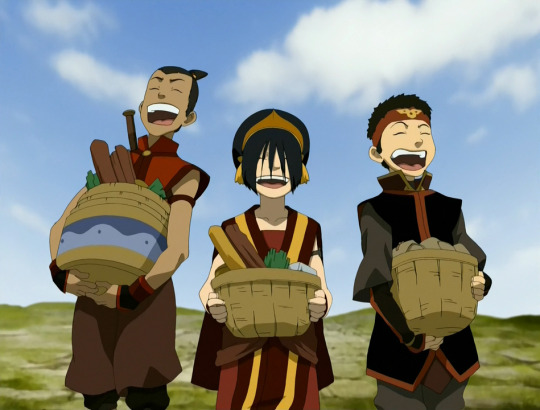
the more i see people discuss how strangely sokka’s character is portrayed in “the runaway” the more i cannot help but feel that all my ad hoc rationalizations and justifications as to why he would contradict himself so greatly might actually be meaningless. why would he allow the gaang to endanger themselves for foolish reasons when he is the overly paranoid voice of caution in literally every other episode? why would he be so easily swayed by toph’s manipulative promise of buying him a fancy atlas when he’s literally holding her wanted poster? and most crucially, why would he say that he sees katara as his mother when no other episode in the show indicates that this is remotely the case?
this episode is great for katara and toph, whose hangups are compellingly explored here. i won’t get into the common misconceptions about katara being “motherly” or why they’re even at loggerheads to begin with, as i’ve discussed this at length in the past, but it’s actually undeniable that the assumption that katara is the de facto “mom friend” stems primarily from this episode, where toph all but outright accuses her of fancying herself their collective mother. however, katara becoming “the mother” of the group is very much a post-toph shift in her character, and you see her femininity being accentuated in contrast with toph’s deliberate lack of femininity also being linked to this sort of maternal role that she occasionally adopts, especially around toph. but i don’t actually think the issue is one of katara being a smothering, maternal figure towards toph, but rather a miscommunication regarding power, gender, class, and community vs independence. when katara and toph fight, it is for far more complex and nuanced reasons than the notion that katara is simply too overbearing. if anything, it’s the way in which she is overbearing that irks toph, just as toph’s rudeness is not the central issue, but rather that toph’s values (those of total independence and freedom) are misinterpreted as malice by katara (who values community and collaboration), and vice versa.
something very crucial to understand about this episode is that katara is not actually mad that toph endangered their group by pulling fun scams. katara has endangered their group countless times in the past to satisfy her own impulsive desires (and yes, she wants justice, but toph similarly rationalizes her scams through the lens of achieving moral vindication). katara would be all over toph’s scammery, would come up with scams of her own, would be having more fun than anyone—had she been included from the start. which is exactly the point. it is her exclusion that foments her critique, not the subject of their act itself (and the reason that you could not replace katara with sokka in this scenario is simply because toph would never exclude sokka in the first place). but katara would never admit that she is hurt by toph’s exclusion aloud, because katara is an extremely proud person. and a prideful, wounded fourteen year old is not going to thoughtfully use “i statements” as if in a group therapy session with the equally prideful twelve year old who deliberately excluded her; no, she is going to lash out. (lest we forget that in their first real episode establishing their group dynamic, katara literally mocks toph’s blindness. hardly an okay thing to do, in my opinion!) their conflict stems from their differences, but also from their similarities. they are both proud, angry, powerful, stubborn, and must assert their dominance at all times. it’s clear they both want to be friends with each other, and at times they are, but it is really only in this episode where they are able to cross a threshold that allows them to be truly honest about more meaningful insecurities than simply their looks (although i do of course find their exchange in “tales” beautiful as well). and you know who is instrumental (albeit reluctant to interfere) in facilitating that growth? sokka.
i’ve gone more in depth in the past analyzing why sokka’s speech in this episode regarding his mother and katara isn’t exactly as it sounds. i personally interpret his admission, that katara has always been there for him and that her face is all he sees when he tries to picture his mother, as an illustration of his codependent attachment to her, as she is the very locus of his identity. this interpretation is compounded by the fact that when kya’s face is finally revealed later in the season, she does bear an uncanny resemblance to sokka, which to me signifies the way in which sokka sublimates his own face for katara’s—which is also deeply unhealthy, but in a different way than an older brother parentifying his younger sister would be.
the fact is that there is simply no indication throughout the entire show (including this episode) that sokka views or treats katara as a parent. there are of course moments wherein she supports him emotionally or materially, but most of the time she is in fact teasing, tormenting, undermining, yelling at, or otherwise making life harder for him, at which point he is far more likely to act as her guardian figure and admonish her while simultaneously helping her get out of whatever mess she’s caused. and considering that sokka’s defining moment is when hakoda stakes his identity to protecting his (ontologically special) sister (which, as we know, as the bearer of kya’s face, in fact means dying for her), this dynamic makes far more sense than the other way around. i know that people commonly portray katara as the voice of reason who cleans up sokka’s messes, but besides a couple examples, it’s consistently the other way around. yes, it’s very easy to assume that sokka’s speech indicates that he sees katara as his replacement mother, but we cannot take this speech at face value if we are also to take the rest of the text into account, which we must.
but then there’s also the other glaring question that must be taken into account: why would sokka even allow all this? considering the first thing toph bartered was the sword he has painstakingly crafted just an episode prior, why didn’t sokka just pull the plug then and there? it really doesn’t make sense that sokka wouldn’t take katara’s side just for practical, logistical reasons. even if she doesn’t really care about the own point she’s making (as demonstrated by the fact that the scam she devises literally lands her in jail), sokka would see the logic in it. but... he does. he is the one to first discover the wanted poster, and he immediately points out to toph that their scams are drawing undue attention to her, and that they should put an end to it now that's it's putting them at risk. and yet, toph successfully bribes him, and so he continues to participate. why? what about the prospect of having money is so appealing to sokka that he’s willing to risk his precious rationality and caution for the potential of acquiring more of it? well, it’s actually quite simple.
toph is scamming for the thrill of the game. she loves proving the kind of men who undermined and demeaned her all her life wrong. she loves humiliating the people of the world who had once humiliated her. she’s not someone who values earthly possessions or really even understands that money is a finite resource. to her, these scams are a matter of ego. aang is also scamming for the thrill of the game. he loves a prank, a bit of mischief, getting into some tomfoolery. he loves spending time pulling hijinks with his friends. it’s funny, it’s fun, and it’s lucrative on top of that. but it’s clear that he views it as a game. now, sokka similarly enjoys pulling these scams. he adores toph and clearly finds it nearly as satisfying as she does to watch her destroy the egos of men thrice her size. but even more potent than his adoration for toph, is his appreciation for money.
when katara put them all in danger countless times in the past, it may have been to enact righteous justice, but it was never materially beneficial to sokka. sokka is a very practical person, and growing up in a state of colonial abjection taking on the role of provider for a couple dozen people mostly comprised of elderly women and small children makes you appreciate the value of goods and resources in a way that an aristocrat and a monk do not. you may be asking, "are you really arguing that sokka would undermine his own values and endanger himself and his friends so readily for the prospect of financial security?" to which i would argue that you underestimate how truly cynical sokka is. of course he loves money and food he doesn’t have to catch or forage – see: his appreciation for the immediate luxury of ba sing se that everyone else finds so stifling. he is not spiritual; he is attached to earthly possessions and the immediate physical needs of those around him. so of course he loves a material object. in his own words: “i do believe in the power of stuff.” because even when sokka is supposedly being uncharacteristically foolish or naive, he is in fact nonetheless promoting the cynic’s agenda every step of the way.
“the runaway” is a good episode, perhaps even a great one. however, it has also lent to some of the fundamental misinterpretations i see of katara, sokka, and toph that are constantly thrown around (including the occasional citing of this episode to justify that aang apparently “sees katara as his mother”). so in some ways, i do resent this episode for begetting those strange and incorrect takes, even if i think that in a vacuum, it is well-executed. it is an episode that complicates our characters, adds nuances and shades of grey to their pre-established characterizations, but does not actually rewrite them. sure, if this was the only episode of the show i had ever seen, i too might assume that katara was the maternal and responsible figure of the group, toph was a careless and rude little bitch, and aang and sokka were idiots who relied solely on katara’s infinite well of long-suffering guidance. but even within this episode, that is clearly not established to be the case, and if that notion is not sufficiently undermined by the episode’s conclusion, it is quite clearly by the episodes bracketing it, which provide crucial context through which to inform our understandings of the choices made in this episode, and why they are indeed interesting, but nonetheless do not reflect the characterizations established in the series as a whole.
#id in alt text#analysis#katara#toph#sokka#aang#katara&toph#katara&sokka#this episode is sooo#well. i like it#but the things it has done to how this fandom reads the gaang dynamic#is just. goddawful#so here are my 2 cents on why it IS in fact in character#but simply. no one is reading is correctly#feel free to disagree tho you can just straight up think its a bad episode thats okay too#i love katara and toph fighting in the mud sm tho#how could you ever hate that. i ask of you. how
206 notes
·
View notes
Text
BUFFY READING LIST
As promised @possession1981 and I have compiled a list of Buffy the Vampire Slayer (and Angel) related academic text and books. I think this is a good starting point for both a long time fan and for someone just getting into the show, or just someone interested in vampire lore. I have included several books about the vampire lore and myth in general as well. Most of these are available online.
BOOKS
Fighting the Forces: What's at Stake in Buffy the Vampire Slayer; edited by Rhonda V. Wilcox & David Lavery
Buffy the Vampire Slayer and Philosophy - Fear and Trembling in Sunnydale by James B. South
Buffy Goes Dark: Essays on the Final Two Seasons of Buffy the Vampire Slayer on Television, edited by Lynne Y. Edwards, Elizabeth L. Rambo & James B. South
Buffy the Vampire Slayer: Myth, Metaphor and Morality by Mark Field
Televised Morality: The Case of Buffy the Vampire Slayer by Gregory Stevenson
Undead TV: Essays on Buffy the Vampire Slayer by Elana Levine
The Aesthetics of Culture in Buffy the Vampire Slayer by Matthew Pateman
Girls Who Bite Back: Witches, Mutants, Slayers and Freaks by Emily Pohl-Weary
Why Buffy Matters: The Art of Buffy the Vampire Slayer by Ronda Wilcox
Into Every Generation a Slayer Is Born: How Buffy Staked Our Hearts by Evan Ross Katz
The Lure of the Vampire: Gender, Fiction, and Fandom from Bram Stoker to Buffy the Vampire Slayer by Milly Williamson
Blood Relations: Chosen Families in Buffy the Vampire Slayer and Angel by Jes Battis
Sex and the Slayer: A Gender Studies Primer for the Buffy Fan by Lorna Jowett
Diseases of the Head: Essays on the Horrors of Speculative Philosophy; edited by Matt Rosen (chapter 2 Death of Horror)
Public Privates: Feminist Geographies of Mediated Spaces by Marcia R. England (chapter 1 Welcome to the Hellmouth: Paradoxical Spaces in Buffy the Vampire Slayer)
Open Graves, Open Minds: Representations of Vampires and the Undead From the Enlightenment to the Present Day; edited by Sam George and Bill Hughes (chapter 8 ‘I feel strong. I feel different’: transformations, vampires and language in Buffy the Vampire Slayer)
The Contemporary Television Series; edited by Michael Hammond and Lucy Mazdon (chapter 9 Television, Horror and Everyday Life in Buffy the Vampire Slayer)
Joss Whedon and Race: Critical Essays; edited by Mary Ellen Iatropoulos and Lowery A. Woodall III
Buffy and the Heroine's Journey: Vampire Slayer as Feminine Chosen One by Valerie Estelle Frankel
The Existential Joss Whedon: Evil and Human Freedom in Buffy the Vampire Slayer, Angel, Firefly and Serenity by J. Michael Richardson and J. Douglas Rabb
Buffy the Vampire Slayer 20 Years of Slaying: The Watcher's Guide Authorized by Christopher Golden
Reading the Vampire Slayer: The Complete, Unofficial Guide to 'Buffy' and 'Angel' by Roz Kaveney
Hollywood Vampire: The Unnoficial Guide to Angel by Keith Topping
Buffy the Vampire Slayer: The Monster Book by Christopher Golden
Slayer Slang: A Buffy the Vampire Slayer Lexicon by Michael Adams
What Would Buffy Do? The Vampire Slayer as Spiritual Guide by Jana Riess
ARTICLES, PAPERS ETC.
Bibliographic Good vs. Evil in Buffy the Vampire Slayer by GraceAnne A. DeCandido
Undead Letters: Searches and Researches in Buffy the Vampire Slayer by William Wandless
Weaponised information: The role of information and metaphor in Buffy the Vampire Slayer by Jacob Ericson
Buffy, Dark Romance and Female Horror Fans by Lorna Jowett
My Vampire Boyfriend: Postfeminism, "Perfect" Masculinity, and the Contemporary Appeal of Paranormal Romance by Ananya Mukherjea
Buffy, The Vampire Slayer as Spectacular Allegory: A Diagnostic Critique by Douglas Kellner
"Buffy the Vampire Slayer": Technology, Mysticism, and the Constructed Body by Sara Raffel
When Horror Becomes Human: Living Conditions in "Buffy the Vampire Slayer" by Jeroen Gerrits
Post-Vampire: The Politics of Drinking Humans and Animals in "Buffy the Vampire Slayer, Twilight", and "True Blood" by Laura Wright
Cops, Teachers, and Vampire Slayers: Buffy as Street-Level Bureaucrat by Andrea E. Mayo
"Not Like Other Men"?: The Vampire Body in Joss Whedon's "Angel" by Lorna Jowett
Buffy the Vampire Slayer and the Domestic Church: Revisioning Family and the Common Good by Reid B. Locklin
“Buffy vs. Dracula”’s Use of Count Famous (Not drawing “crazy conclusions about the unholy prince”) by Tara Elliott
A Little Less Ritual and a Little More Fun: The Modern Vampire in Buffy the Vampire Slayer by Stacey Abbott
Undressing the Vampire: An Investigation of the Fashion of Sunnydale’s Vampires by Robbie Dale
"And Yet": The Limits of Buffy Feminism by Renee St. Louis & Miriam Riggs
Meet the Cullens: Family, Romance and Female Agency in Buffy the Vampire Slayer and Twilight by Kirsten Stevens
Bliss and Time: Death, Drugs, and Posthumanism in Buffy the Vampire Slayer by Rob Cover
That Girl: Bella, Buffy, and the Feminist Ethics of Choice in Twilight and Buffy the Vampire Slayer by Catherine Coker
A Slayer Comes to Town: An Essay on Buffy the Vampire Slayer by Scott Westerfeld
Undead Objects of a “Queer Gaze” : A Visual Approach to Buffy’s Vampires Using Lacan’s Extended RSI Model by Marcus Recht
When You Kiss Me, I Want to Die: Gothic Relationships and Identity on Buffy the Vampire Slayer by Ananya Mukherjeea
Necrophilia and SM: The Deviant Side of Buffy the Vampire Slayer by Terry L. Spaise
Queering the Bitch: Spike, Transgression and Erotic Empowerment by Dee Amy-Chinn
“I Want To Be A Macho Man”: Examining Rape Culture, Adolescent Female Sexuality, and the Destabilization of Gender Binaries in Buffy the Vampire Slayer by Angelica De Vido
Staking Her Claim: Buffy the Vampire Slayer as Transgressive Woman Warrior by Frances H. Early
Actualizing Abjection: Drusilla, the Whedonversees’ Queen of Queerness by Anthony Stepniak
“Life Isn’t A Story”: Xander, Andrew and Queer Disavowal in Buffy the Vampire Slayer by Steven Greenwood
S/He’s a Rebel: The James Dean Trope in Buffy the Vampire Slayer by Kathryn Hill
“Once More, with Feeling”: Emotional Self-Discipline in Buffy the Vampire Slayer by Gwynnee Kennedy and Jennifer Dworshack-Kinter
“The Hardest Thing in This World Is To Live In It”: Identity and Mental Health in Buffy the Vampire Slayer by Alex Fixler
"Love's Bitch But Man Enough to Admit It": Spikes Hybridized Gender by Arwen Spicer
Negotiations After Hegemony: Buffy and Gender by Franklin D. Worrell
Double Trouble: Gothic Shadows and Self-Discovery in Buffy the Vampire Slayer by Elizabeth Gilliland
'What If I'm Still There? What If I Never Left That Clinic?': Faërian Drama in Buffy's "Normal Again" by Janet Brennan Croft
Not Gay Enough So You’d Notice: Poaching Fuffy by Jennifer DeRoss
Throwing Like A Slayer: A Phenomenology of Gender Hybridity and Female Resilience in Buffy the Vampire Slayer by Debra Jackson
“You Can’t Charge Innocent People for Saving Their Lives!” Work in Buffy the Vampire Slayer by Matt Davies
Ambiguity and Sexuality in Buffy the Vampire Slayer: A Sartrean Analysis by Vivien Burr
Imagining the Family: Representations of Alternative Lifestyles in Buffy the Vampire Slayer by Vivien Burr and Christine Jarvis
Working-Class Hero? Fighting Neoliberal Precarity in Buffy’s Sixth Season by Michelle Maloney-Mangold
A Corpse by Any Other Name: Romancing the Language of the Body in Mary Shelley's Frankenstein for the Adam Storyline in Buffy the Vampire Slayer by Amber P. Hodge
Sensibility Gone Mad: Or, Drusilla, Buffy and the (D)evolution of the Heroine of Sensibility by Claire Knowles
"It's good to be me": Buffy's Resistance to Renaming by Janet Brennan Croft
Death as a Gift in J.R.R. Tolkien’s Work and Buffy the Vampire Slayer by Gaelle Abalea
“All Torment, Trouble, Wonder, and Amazement Inhabits Here": The Vicissitudes of Technology in Buffy the Vampire Slayer by James B. South
Staking Her Colonial Claim: Colonial Discourses, Assimilation, Soul-making, and Ass-kicking in Buffy the Vampire Slayer by Jessica Hautsch
“I Run To Death”: Renaissance Sensibilities in Buffy the Vampire Slayer by Christine Jarvis
Dressed To Kill: Fashion and Leadership in Buffy the Vampire Slayer by Christine Jarvis and Don Adams
Queer Eye Of That Vampire Guy: Spike and the Aesthetics of Camp by Cynthea Masson and Marni Stanley
“Sounds Like Kinky Business To Me”: Subtextual and Textual Representations of Erotic Power in Buffyverse by Lewis Call
“Did Anyone Ever Explain to You What ‘Secret Identity’ Means?”: Race and Displacement in Buffy and Dark Angel by Cynthia Fuchs
“It’s About Power”: Buffy, Foucault, and the Quest for Self by Julie Sloan Brannon
Why We Love the Monsters: How Anita Blake, Vampire Hunter, and Buffy the Vampire Slayer Wound Up Dating the Enemy by Hilary M. Leon
Why We Can’t Spike Spike?: Moral Themes in Buffy the Vampire Slayer by Richard Greene and Wayne Yuen
Buffy, the Scooby Gang, and Monstrous Authority: BtVS and the Subversion of Authority by Daniel A. Clark & P. Andrew Miller
Are Vampires Evil?: Categorizations of Vampires, and Angelus and Spike as the Immoral and the Amoral by Gert Magnusson
BOOKS ABOUT VAMPIRE LORE AND MYTH IN GENERAL
The Vampire Lectures by Laurence A. Rickels
Our Vampires, Ourselves by Nina Auerbach
Vampires, Burial, and Death: Folklore and Reality by Paul Barber
The Secret History of Vampires: Their Multiple Forms and Hidden Purposes by Claude Lecouteux
The Vampire Cinema by David Pirie
The Living and the Undead: Slaying Vampires, Exterminating Zombies by Gregory A. Waller
Vampire Forensics: Uncovering the Origins of an Enduring Legend by Mark Jenkins
Slayers and Their Vampires: A Cultural History of Killing the Dead by Bruce A. McClelland
The History and Folklore of Vampires: The Stories and Legends Behind the Mythical Beings by Charles River Editors
Encyclopedia of Vampire Mythology by Theresa Bane
Vampires of Lore: Traits and Modern Misconceptions by A. P. Sylvia
The Vampire: A New History by Nick Groom
Vampyres: Genesis and Resurrection: from Count Dracula to Vampirella by Christopher Frayling
Race in the Vampire Narrative by U. Melissa Anyiwo
Vampires, Race, and Transnational Hollywoods by Dale Hudson
229 notes
·
View notes
Text
Miles promising his mom to protect the little boy she raised now that he's growing up vs Miguel and Jessica Drew likely compromising their morals to protect their own children
#the common denominator between them is that they're both parents#spiderman#miles morales#miguel o'hara#jessica drew#atsv#across the spiderverse
3K notes
·
View notes
Text
Kung Fu Panda 4 Rewrite Thing
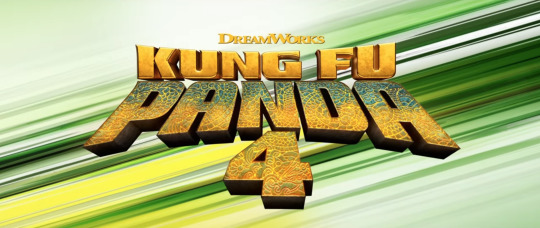
Been chewing on this movie for a while now and wanted to take a shot at improving it. Some parts are a bit rough but I think this gets the general idea across.
As a rule, I'm trying to keep most of the characters and elements/plot beats in place rather than spinning things off in a completely unrelated direction. I also am aware of the restrictions placed on this movie, such as an unwillingness to rehire high-profile VAs and runtime limitations. This is just meant to be a "what if" kind of thing. That said:

We open with a stylized sequence of Po telling the story of his and the Five's latest battle. As it ends it's revealed he's at the grand opening of Mr. Ping's brand new bigger, better noodle shop location, talking to the customers.
As one of them asks where the Five are now, Po explains that they got summoned to their own individual missions, but they'll be back soon.
(Yes I am still having them be MIA, as Po needs to be alone with Zhen for part of the movie. However, they'll only gone for the first part of this rewrite and for a very specific plot-related reason.)
(The thing with Po needing to give up his title of Dragon Warrior makes no sense for multiple reasons, so let's just drop that plot point entirely. I get that it's meant to tie into the "change" moral, but I'd rather have Po imparting this lesson onto Zhen instead of learning it himself, as otherwise it undermines the character growth he had in 3.
Also, Po isn't carrying the staff around with him constantly in this rewrite, as it looks a bit silly and isn't plot relevant here.)
A messenger shows up to report that the Jade Palace is under attack. Po decides to rush over just in case Shifu needs backup... which he does, because he's being kidnapped in a small one of those magic-proofed cages from the actual film.
(Shifu being kidnapped was tossed around in the writing room originally and I want to keep it in this rewrite because it A) gives Shifu something to do, and B) I want to allow Zhen to openly be working with the Chameleon in order to help flesh out her character and avoid the lackluster plot twist, meaning she'll need new leverage against Po later on.)
The figure behind the kidnapping appears to be Master Elephant, which confuses Po as he's been missing for several months. Right as he's about to land a finishing blow, the figure shape shifts into Master Chicken, throwing Po's attack and resulting in him getting a bad head injury. He does his best to pursue the attackers, but can't keep up. Dismayed, he returns to the Jade Palace...
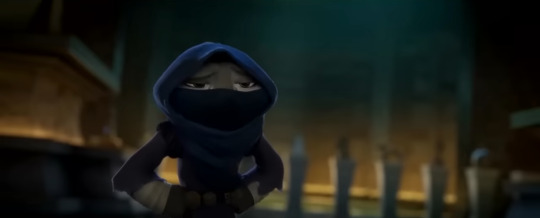
...And finds Zhen trying to steal something, using the commotion outside as a distraction. Po fights, but he's still badly injured and can't give it his all, resulting in Zhen being able to slip away with her prize—a dust bunny from under the furniture. Po is baffled.
(Side note: I would probably redesign Zhen so she actually looks like she matches the other characters' style, but I digress.)
Feeling dismayed, he returns to the noodle shop, where both his dads work on treating his wounds and comforting him. As Po explains what happened, Mr. Ping mentions that customers have been circulating rumors about a shapeshifting sorceress in Juniper City. Po decides that that's where he needs to go, promises his dads he'll be safe, and leaves.
(I'm cutting Mr. Ping and Li's subplot, because as much as I love them they don't really add much to the plot. It also feels like it goes against Mr. Ping's characterization in KFP 1 and 2 in particular.)
This is where we can have the scene of the Chameleon vs. the crime bosses. This can mostly stay the same except one of the bosses attempts to attack her when she shape shifts, causing her to retaliate with a magic-based attack. She also needs to straight-up kill the guy to establish her and her sorcery as a legit threat.
Po arrives at the Happy Bunny tavern to look for a ride to Juniper City. As he talks to Fish and Chip, he notices Zhen nearby doing some black market trading with Granny Boar to obtain a white feather. Po confronts her and she tries to run out with the feather, causing the boar family to pursue in a big fight scene.
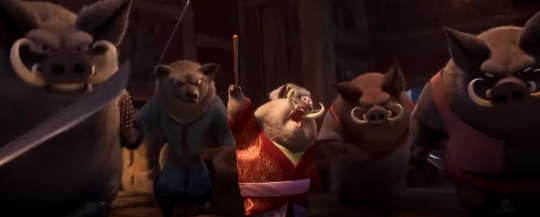
Po and Zhen manage to escape, Zhen stashing the feather. Po threatens to have her sent to jail, but Zhen confirms she's working for the Chameleon and can lead Po to her so he can rescue Shifu. Po dislikes this situation, but has no choice but to agree.
(Unlike in the actual film, I would make it so her lair is hidden in some fashion; magic that keeps it camouflaged would be appropriate for a chameleon, or it could be underground or hidden behind something. Regardless, it should be impossible to locate without Zhen's assistance.)
On the boat ride over to Juniper city, Zhen says that she has to "obtain" one more item from the local history museum or she'll be in big trouble with the Chameleon. Po doesn't like this detour, but once again has no choice in the matter.
Po asks why Zhen would want to work for someone so obviously evil, and this is the point where Zhen admits she was adopted by the Chameleon and we get her backstory.
(I would establish that the Chameleon has an actual name, but only Zhen uses it. It shows that Zhen is closer to her than most, not quite seeing her as a mother but not fearing her enough to use her preferred title. Also, the Chameleon's the only KFP villain without a proper name and that bothers me.)
The backstory can be the same, but the part about her living on the streets and meeting the Chameleon for the first time should be merged into a single flashback.
Zhen says that Po couldn't understand, but Po reveals that he's also adopted, and that he probably would commit some noodle-related crime if his dad asked him to. Still, Zhen insists that people don't change, and that includes her.
They arrive at Juniper city (Po is impressed at its size but he very much is not acting like he's never seen a city before). Zhen covers up her muzzle and tucks her tail under her clothes so she won't be recognized.
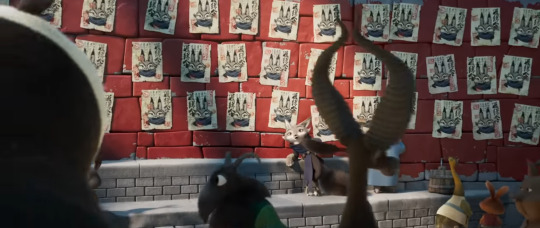
Zhen is ready to break into the museum, but Po says that he's got this and goes up to the guards to tell them that he has some official Dragon Warrior business to take care of and will need to borrow some ancient artifacts.
Unlike in the actual film, everyone ready acknowledges him as the Dragon Warrior. The guards are more than happy to loan him whatever he needs... until Zhen's tail pops out and the guards recognize her, prompting them to attack.
During the scuffle, Zhen uses a chi blast to knock back one of the guards, but almost gets taken out by the other guard coming up behind her. Po defends her but gets mildly injured as a result.
After the fight, Po asks about the chi move and Zhen states that the Chameleon taught her the basics.
Zhen confirms that the Chameleon is a master of chi, and that the sorcery she uses is a specific type of chi manipulation.
(The reason I'm connecting chi to her powers is that it makes them feel a bit less out of left field, and helps 4 feel like a logical progression from 3.)
Zhen admits that she's not very good at using chi, but Po points out that it took him years to use chi in battle. He also compliments her on her kung fu, and she confirms she's self-taught.
(In this rewrite, Zhen is good at fighting but not quite at the level she is in the actual movie. This is to address the issue of who taught her if the Chameleon doesn't know kung fu.)
He takes a moment to give her a few pointers, which causes her to ask why he took that blow for her earlier, figuring there's a catch. Po just says it's the right thing to do, but Zhen is skeptical, figuring he only did it because he still needs her to lead him to Shifu.
The reminder of Shifu prompts Po to move on, and they grab the item Zhen was after, a 500 year old set of blades, then run for it.

Po and Zhen arrive at the Chameleon's lair, and Zhen shows Po how to get inside and tells him where Shifu is being held. She says that she'll take the items to the Chameleon, which will distract her while Po breaks him out. Po thanks her, and the two separate. Zhen warns him of booby traps on the way out.
There are indeed booby traps, such as those saw contraptions from the actual movie and a bunch of guards. It takes Po a few minutes, but he eventually gets through them.
Po finds Shifu being held in a dark room. Shifu is glad to see him, but warns him to be careful as the Chameleon's likely not far away. Po explains Zhen's distraction and moves to free him... only for a cage to fall down and trap him as well.
"Shifu" is then revealed to be the Chameleon in disguise, who slips through the bars via shape shifting into a mantis and thanks Zhen for her help. Zhen apologizes to Po, who's naturally upset ("I mean, I know you were evil, but I didn't think you were THAT evil").
Zhen hands over the three items she collected, and it's confirmed what they are: a dust bunny that contains a clump of Tai Lung's fur, a feather from Lord Shen, and a pair of blades once wielded by Kai.
Po mistakenly interprets this as the Chameleon being a collector of kung fu memorabilia and tries to chat about the Jade Palace's collection, much to her bafflement.
The Chameleon explains that a trace of a person's chi remains long after their death, and demonstrates by doing The Tongue Thing on Kai's blade, stripping its chi, and immediately taking his form.
(As you may have picked up on, this rewrite removes the spirit world elements entirely. While they are really interesting, I think cutting them is the best option because:
1. There is so much plot involved with bringing Po's old enemies back that you could make that an entire movie in and of itself. It's hard to do it justice when you're cramming it in around the edges of this movie.
2. It makes the Chameleon too similar to Kai in terms of abilities.
3. Having her rely on stealing other's kung fu makes her come across as weak despite being a powerful sorceress.)
Po asks her if her goal is to take over China, but she says no; she just wants to end the practice of kung fu for good, and prove that sorcery is the superior option. To prove it, she has Shifu brought in.
While having your chi stripped does not remove one's kung fu abilities in this rewrite, it is still removing part of one's life energy and thus weakening them severely for a period of time—ergo, Shifu is still unable to fight at his best. Still, he manages to hold his own.
Instead of using kung fu, the Chameleon relies on the brute animalistic strength and inherent abilities of the forms she takes, switching whenever she's loosing to keep her opponents on her toes and even transforming into Shifu himself for a period. She also uses a few chi-based attacks.
Just when it looks like Shifu is about to win the fight, she uses her tongue to strip the chi from the fur clump, taking the form of Tai Lung. Shifu is so shocked and distraught that he fails to attack, allowing the Chameleon to land a serious blow.

She returns to her original form and states that when the blood moon has risen, she will battle and take down every master in the middle of Juniper city, where everyone can learn just how useless kung fu and the people who teach it are. She leaves Po in his cage panicking over Shifu, who's unresponsive.
Zhen follows the Chameleon outside, where we get the "does the blood moon always rise so slowly" gag. Noticing that Zhen looks troubled, she asks what's wrong, and Zhen talks about how Po encouraged her to do the right thing. Even though she's been told that kung fu masters are elitist, selfish people, she couldn't see any of that in Po.
(Side note: I want to establish in this rewrite that while the Chameleon will claim up and down that Zhen is only a pawn for her to use, she does care about her to some extent, even though probably loathes the fact she does. For example, when talking to Zhen here, she might pick some rubble out of her fur or something to show there's a teeny tiny bit of actual affection hidden there.
The reason for this is that all other KFP villains have had an emotional anchor—Shifu for Tai Lung, Shen's parents for Shen, and Oogway for Kai. The Chameleon being abusive but having some real love for Zhen and Zhen struggling with her gaslighting adds a lot more depth to both of them.)
The Chameleon finally reveals her backstory, which should be told in a hyper-stylized way à la the flashbacks in KFP 2 and 3. Just like Zhen, she grew up on the streets as an orphan, broke and starving. She admired kung fu greatly and wanted to learn it, but everyone turned her away for having no money to pay for lessons.
One day, she found a shiny jade amulet on the streets that someone lost, finally giving her a much-needed break. She is able to use that money to enroll in classes.
The problem was that while the money changed her financial status, it didn't change the way people saw her. Her master still considered her a lowly gutter rat and treated her as such, verbally insulting her and beating her down during training sessions. It's very much like how Shifu treated Po in KFP 1, except worse, especially because the Chameleon is a small and fragile animal.
Finally, during one training session she became too injured to move. Her master told her to quit and started to walk away, only for her to grab his leg with her tongue to trip him up. However, at the peak of her self-loathing, she instead discovered her chi stealing abilities and transformed into him. It's not shown, but it is implied she killed him.
As the flashback ends, the Chameleon shifts into Zhen and tells her that no matter how much you change, you can't change the way other people see you. Siding with Po, she says, will only get her hurt. Zhen nods and unexpectedly hugs the Chameleon, telling her she knows, and runs off.
Cutting back to Po, we see him frantically trying to break the bars of his cage. Zhen comes forward and drops down on her hands and knees, apologizing for everything. Po says that she came back, and that's what matters.
She reveals that the "hug" was actually just a way for her to get the key off of the Chameleon, and she uses it to unlock Po's cage. Po runs over to Shifu and he and Zhen heal him with chi, and we get a callback to the "I'M NOT DYING YOU IDIOT" scene from KFP 1.
However, while Shifu's not dying, he is very badly injured and can barely walk on his own. Po asks how they can take on the Chameleon and her army with just three of them, but Zhen holds up the key and suggests they get an army of their own.
Running downstairs, Zhen reveals where the other masters are being held. To Po's shock, the Furious Five are among those captured. Tigress confirms that the summons they received were traps laid by the Chameleon, and she already has their forms.
Also down there are the other crime bosses, as it feels like they just disappear in the actual film after their scenes.
Zhen only manages to unlock the Five's cages before before the Chameleon snatches the key back with her tongue, revealing that she knew Zhen was lying to her. Behind her, her army assembles.
Tigress confirms that that the Five will take on the army, and Po faces off with the Chameleon one-on-one. She strips the feather and uses Shen's form to fly up and take the upper ground, trying to kick a cage onto him. Zhen helps deflect it, and the Chameleon tells her to stay out of the way. Po and her continue to battle.
Despite Po's best attempts at blocking it, she does finally stick him with her tongue. He grabs it and throws her a distance in her fragile base form, injuring her but still giving her some of his chi in the process.
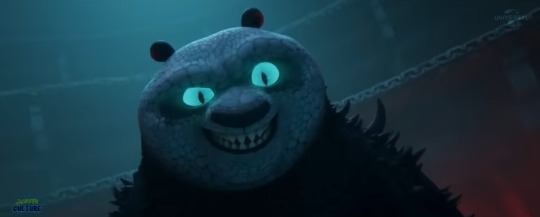
The Chameleon takes on Po's form next, and we get a fight similar to the one in the movie, though once again with her using less kung fu and more magic and physical attacks.
She mentions how she was rejected and tries to tell him that he should be on her side, because a bit fat panda like him must have been treated just as badly as she was. Po denies this, but Shifu admits it's pretty accurate. Po says he's not helping.
Po admits that she has a point, except she forgot one thing, and we get a callback to the "I'm THE big fat panda" moment from KFP 1.
The two attack at the same time. As the dust clears, it's revealed that neither are doing great—Po has gotten a lot of little injuries and the chi stealing has weakened him. The Chameleon is struggling to shapeshift at all, with the attempt causing her pain, and instead settles for trying to blast him. Zhen steps in and manages to redirect the attack back at her.
The Chameleon takes the blow and ends up back on the floor as a parallel to her flashback. Zhen reaffirms that she disagrees with her worldview—people can change, and she's going to prove it. If the Chameleon wants get to Po, she'll need to get through her first.
The Chameleon kind of laughs this off at first before realizing she's dead serious. She states that Zhen isn't even good at fighting, but Po disagrees, giving Zhen a confidence boost. The Chameleon struggles to her feet as if readying an attack, everyone braces themselves... and she surrenders, too injured to fight and unable to bring herself to hurt Zhen.

(There are a few reasons why I think her surrendering makes for an interesting defeat here:
1. There's no spirit realm portal to yeet her into in this version;
2. There's only so many times Po's enemies can be yeeted directly into the spirit realm before it gets old;
3. It adds character depth, and;
4. It ties back nicely in to the theme of change and that it's never too late to do the right thing.)
Zhen helps the Chameleon up, Tigress does the same for Po, and Monkey does the same for Shifu. The five reveal that despite being exhausted, they still managed to wipe the floor with the Chameleon's army, which Zhen thinks is incredible. Po introduces Zhen to them formally, and Shifu asks if they can save the introductions for after they get medical treatment.
Later on, Po (carrying the staff Oogway gave him) approaches Zhen, who's sitting under the peach tree by the Jade Palace. He asks her if she's doing okay after everything that's happened. She says she's alright, but is pretty scared of what's going to happen next, given that the Chameleon's in jail and she has nowhere to go.
Po reveals that him and Shifu have been talking, and he plans to open a new school as part of the Jade Palace that will offer free kung fu lessons to anyone who's interested in learning. Zhen asks if there are any spots open, and we end similar to the actual movie, with her training alongside the five.
the credits still end with the Jack Black cover of Baby One More Time because it slaps
#kung fu panda#kfp#kung fu panda 4#kfp 4#po#shifu#zhen#the chameleon#outdesign posts things#outdesign attempts to write#been chewing on zhen and the chameleon's characters like a dog with a new toy#apparently tumblr removed the ability to add sub bullets so sorry if this is a wall of text. hopefully the images help a bit
133 notes
·
View notes
Text
i know everyone is sick of hearing me talk about this, but there is something so interesting about this idea that orihime is the one who witnesses ichigo's hollow transformations in all of its stages and that her pov is usually our indicator for whether or not he's too far gone. this is especially interesting when you consider the fact that the heart motif shows up repeatedly in her character arc. what is a hollow, if not a being that has lost its heart? orihime saw this happen to sora, so we can tell why it makes her uncomfortable every time ichigo loses a little bit of his. she is the 'heart' character, after all–the moral antithesis to ulquiorra's emptiness and nihilism. she believes the heart should be the foundation from which one fights, which is why she's anxious when ichigo loses sight of that and acts on his more vengeful impulses. remember, what zangetsu wants to protect is not what ichigo wants to protect, so they are constantly at odds with each other – the selfless, duty-bound human/shinigami side vs the self-protecting hollow/quincy side. it's why ichigo is so ashamed of himself when he wins his fight against ulquiorra. the only reason he even made it back to his human form at all was because he clung to the promise he made to protect orihime (a promise he made as a human with a moral purpose)
by the time horn of salvation comes around, ichigo proudly shows orihime his new form – orihime, who was traumatized by his complete loss of control (his death). orihime, whose reactions had upset him in his fight against grimmjow. he knows how important it is to her that he remembers why he fights, what impulses he's acting on, who is really the king when he wields his weapon. "this time i'm still me," he says, because he remembers how distraught she was when he was forced to throw everything away for absolute power. ichigo had never been sure about himself before, had always feared and resisted this side of himself before, but he's embraced it now and he can't help but tell her – part showing-off and part reassuring her that he will always be the guy she thinks he is (the one who wins fights and protects people and is endlessly undiscriminating about who he shows his kindness to)!!!! i am dead!!!!!
#i am always going to be a multi-shipper don't get me wrong but absolutely nothing hits harder than ichihime babyyyy#me and the 3 other girls and gays on this site who get it get it idc#ichihime#like. this to me is so indicative of their romance. their shared ideals that they both work so hard to live up to#for their own sake as well as the other's sake.#horn of salvation was true marriage to me i didnt even need to read up to 686 bc their arc had come full circle by that point#they will always be MY beloved m/f ship....uwu <3 ichihime's strongest soldier fr
270 notes
·
View notes
Text
that utterly disgusting post comparing Wei Wuxian not giving up Wen (dogs) and Jiang Cheng giving up his 3 dogs, and how, he's always been in the position of "giving."
NO.
All the people saying in the tags they are "true brothers," absolutely not. To fulfil your status quo siblings, tsundere character and ship, you completely dismiss the entire story.
1. Jiang Cheng has no dog loving tendencies.
2. The scene of giving his dogs up presents an important theme.
Jiang Fengmian tries to get Wei Ying adjusted to the dogs, but he absolutely cannot, so they are made to leave; Jiang Cheng as a child is understandably upset about losing his dogs. To add on, his dad lifts Wei Ying up and Jiang Cheng kicks Wei Wuxian out, scares him with dogs, but feels like he would get into trouble, so he tells his sister, tries to find him, gets injured, and Wei Wuxian promises he won't tell anyone that JC kicked him out; and then, the dogs are gone, but now Jiang Cheng has his favourite subordinate.
What strikes me is that Jiang Cheng, even as a child, holds no true empathy.
- Wei Wuxian has no control over what he absolutely cannot stand; whether it be dogs or injustice. It's integral to his character.
- Wei Wuxian has no control over who lifts him up, loves him, or praises him. None of these actions are meant to be targeted at Jiang Cheng. Yet throughout the plot we see JC losing his mind when someone approaches WWX with positive intentions or says good things about him.
- JC kicked WWX out and scared him with his worst fear; this is the parallel you are meant to be drawing; just like Jiang Cheng threw him out then, Jiang Cheng threw him out now (leaving the Wens to die is not an option.)
- Jiang Cheng worries that he would be admonished by his father which is why he goes to find WWX, but gets injured in the way.
such a pathetic character honestly. the reason he is still alive is because of the former - he fears authority. Killing demonic cultivators? But let Xue Yang go! Why? He's protected by the Jins. Don't fight LWJ because he's powerful.
and the finding WWX, trying to help WWX once but getting injured... lack of capability.
- WWX promising not to tell anyone; and that's it. that's the basis of their relationship. it's one sided as hell. they're not brothers. it's basically abuse. if you've read the book, you would know.
"from Jiang Cheng's perspective" Jiang Cheng doesn't matter! He will always be beneath Wei Wuxian; his whole purpose is to be a red warning sign; Wei Wuxian can kill 50 of Jiang Chengs for all I know; there is no need to dive deeper with your biased, limited knowledge of Jiang Cheng.
- They are not brothers. They are martial brothers. Raised in the same sect and practicing the same cultivation style.
- There's a clear distinction of subordinate vs superior; master vs slave; owner and his killing dog. The point of conflict arises when the dog acts without his master's commands to save common people. It doesn't stem from misunderstanding or any such thing like that - it's out there. Wei Wuxian knows their moral ideologies don't align. He had hoped Jiang Cheng, if not take the Wens into Yunmeng, would at least, let him be. But when the matter is of "Kill them, or I will not stand by you."
Wei Wuxian leaves the sect; it is NOT Jiang Cheng's sacrifice. It is not hurting Jiang Cheng. The most hurt it causes is to Wei Wuxian; who ultimately had to make the choice.
Jiang Cheng is hurt? Oh, is it because Wei Wuxian chose the moral high-ground over playing his lapdog? Jiang Cheng must be furious.
Also, "Jiang Cheng has given and given" - NO.
- Wei Wuxian comes to Lotus Pier and hangs out with friendless, bitter, unloved child Jiang Cheng, matches his competitiveness head on head, coaxes him to talk to people, etc. Accepts all the endlessly bitter taunts and throws out a few in return. Surpasses him in abilities, practices together. They're boys.
- Does all his bidding and requests in Cloud Recessses to do this or that. Jiang Cheng does carry him, when they are 15.
- In Xuanwu Cave, Jiang Cheng also attacked the Wens after Wei Wuxian got burnt; Wei Wuxian was the reason he was able to live. He did travel and ask for aid. But Wei Wuxian also did allow himself to become a bait and usher people out stuck in a cave with a 400 year old monster... what's not clicking?
- and after the fall of lotus pier he strangles Wei Wuxian and hits him, gets done with life, thinks "I'll die heroically" and also sort of out of guilt and remnant care for Wei Wuxian, but instead loses his core.
And then?
Then what? That is it. That's really it for their relationship being giving on Jiang Cheng's side. It died when Lotus Pier did. Yet:
- Wei Wuxian knowingly, consciously gave up his core for the guy who strangled him twice in the past 50 hours or so.
- Without even a core, fought in the war alongside the Jiangs, earned a lot of report; the sunshot campaign is a small arc text wise in the book, yet there are at least three mentions of Wei Wuxian being the reason behind why the Jiangs are extremely powerful.
- Even afterwards acts on JC's orders in the Phoenix Mountain Hunt.
- Keeps protecting Jiang Cheng's name by ensuring it's not about Jiang Cheng or "don't bring him into this."
- Doesn't even attack the Jiangs in nightless city
- JC can enter the barriers still
- even back to life he just wants to get away and not harm him, unlike JC
so basically, fuck Jiang Cheng and more specifically please touch grass. it's one thing to like a character. it's another to dehumanize a bunch of people rescued from labour camp prison where they were dealing with xianxia level of abuse as dogs and justify a powerful clan leader not helping them, especially when he owes them, to show how he once lost his dogs.
Like that is vile.
#canon jiang cheng#jiang cheng#mo dao zu shi#mdzs#wei wuxian#jiang cheng is shit#my thoughts#my essays#my meta
168 notes
·
View notes
Text
I get that having Shadow, Rouge, and Omega as GUN agents is a silly and noncanonical idea but I can't help but write it. I just think that GUN is the perfect environment to show off what makes them tick as characters.
Left to his own devices, Shadow would have no clue what to do with himself. Have someone give him orders and then seeing if those orders align with or challenge his moral values? Watching him struggle with his promise to protect Earth vs his instinct to let everyone else besides himself burn? Very interesting.
Rouge is 10,000x more entertaining to watch if she's put in the position to outsmart her employers while heavily hinted to be working with other interested parties in the meantime. Getting to show off how she's manipulating the threads to ensure she and the select handful she cares about end up on top. Sorry I don't make the rules.
Omega getting forced exposure to other concepts outside of "destroy all eggman robots" via having to contend with a human organization can be played both for laughs and deadly serious. There's no better person to spot idiotic government bureaucracy but he also has to be taught about why prioritizing civilian welfare is part of procedure. Forcing this robot into situation he can't shoot his way out of is much more fun than letting him do as he pleases.
#sth#e-123 omega#e123 omega#shadow the hedgehog#rouge the bat#team dark#I like putting these guys into situations!!!#working for GUN gives them much more of a framework to make stories out of
101 notes
·
View notes
Text

;R1999 DIKKE - General Headcanons

Compilation of headcanons and analysis on Dikke as a character and other related things.

as promised, here's the Dikke post where I go deranged talking about her, since it was one of the two with the most votes in the poll <3
the other popular result was to talk about the parallels and use of racial issues within the story, how the game replaces actual racism for fantasy racism (arcanists vs humans) - so that one will deffo take me some time!

On the subject of justice and Dikke's inspirations.
I've seen some people say that Dikke is based on Joan of Arc, given her righteousness and religious themes - but there are so many more details about her design that point toward other figures!
Like, really. A lot of references to law and deities of justice all throughout history and different cultures.
The most obvious one is Dike, "goddess of justice and the spirit of moral order and fair judgement". In Dikke's interview with Pandora Wilson, they literally address her as "the goddess of justice". And a small statue of Lady Justice, the personification of justice that originates from Justitia (roman equivalent of Dike) can be seen in her insight 2 garment.

It goes without saying that Dikke's sword is another symbol representative of the previously mentioned figures - but to have only the sword and not the scales could have some implications about her way of imparting justice.
I would like to point out that Dikke's sword has these two dangling pieces that allude to the scales she's missing in her design. And sure, it might be a reach, but given how much detail and thought goes into the characters of the game and their designs, I really believe this is the case!
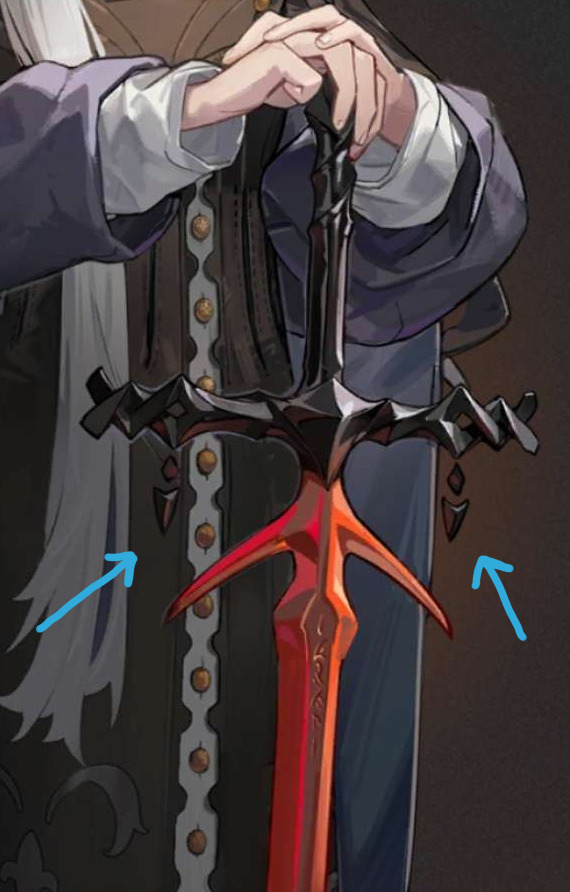
On Dikke's items, we also get the name and description for the sword.
The name alone leads me to believe that Dikke's weapon and its design represents both the sword and the scales of Lady Justice, it's the totality of justice itself. Dikke WIELDS justice, she ENFORCES justice, she IS justice. You're going to get really tired of me repeating the word justice in this post, but bear with me!
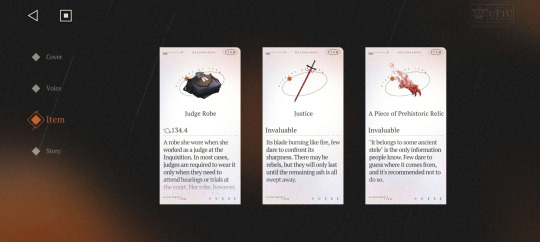
On the subject of swords, there are two swords mentioned all throughout Dikke's in-game profile and information. Her insight 2 garment is titled "Sword of Hamurabi".
This is evocative of something called the "Code of Hammurabi", one of the longest legal texts dating back to the first dynasty of Babylon. According to wikipedia, this stele it also depicts yet another deity of justice, Shamash. Wikipedia also makes note of the prologue within the Code of Hammurabi, in which the author - Hammurabi - claims to have been given these rules "to prevent the strong from oppressing the weak". This is extremely relevant to Dikke, as someone who fought hard for the rights of arcanists.
Pandora Wilson: I have heard many legends about you. The violent ghost of punishment, the crime-slaying sword of execution, the goddess of justice, the people's savior...
Dikke: The desperate always need hope.
The stele of the Code of Hammurabi is ALSO relevant, because the artifact that follows Dikke around explicitly "belongs to some ancient stele". Yet another object that embodies justice and law.
I won't pretend I know anything about Babylonian culture or history in general, so anyone with more insight on this is welcome to add on to details and corrections!
The second sword mentioned can be found in the title for her 02 Story - "The Sword of Damocles".
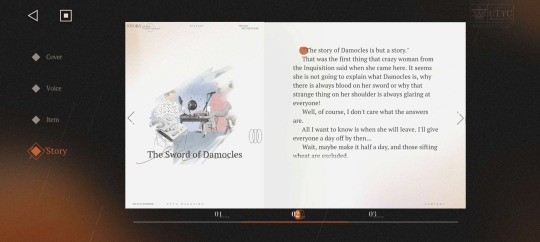
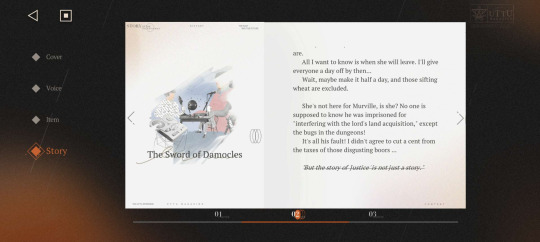
This excerpt seems to be written by one of Dikke's coworkers, perhaps someone in a higher position of power since they mention being able to give others a day off. Overall, we're reading the thoughts of someone who is abusing their power and who does not think highly of Dikke.
"The story of Damocles is but a story" is something that Dikke herself says. At the end, there's a different phrase written and crossed out - "But the story of justice is not just a story".
Now, the anecdote of Damocles talks about how positions of authority and power are double-edged swords - a king may have all the riches and fortune in the world, but also be burdened with the anxiety of knowing there might be someone plotting against him. In the story, Damocles switches places with king Dionysus, to know what it's like to be a king, but to really make Damocles understand the position of king, a sword is placed above him - one that can fall and kill him at any moment.
With this in mind, Dikke's 02 Story becomes more clear - the first phrase is a warning given by Dikke herself to those in positions of power. The story of Damocles is a story, because not everyone will understand the consequences of being in a position of power. Not everyone will be given the opportunity to even reach such a position.
The author of the 02 Story is not a good person, only considering the idea of giving people HALF a day off, excluding those who work on the fields who will get nothing, refusing to lower taxes for the poor, and imprisoning someone who "interfered with the lord's land acquisition".
The sword of Damocles is also used to allude to the impending tragedy for those in positions of power, caused by the smallest of catalysts. So it makes sense to me that the final phrase, the one crossed out at the end, was either written by Dikke or alludes to the demise of this author at her hand.
And while we're at it, might as well talk about the last remaining item - her robes. Judges are required to wear these when working on trials, but Dikke is specifically stated to wear them outside of them - because she's always imparting justice. She's the opposite of Oliver Fog, she's always on the clock.
We haven't even gotten to another big aspect of Dikke's character - the fact that she's part of the Inquisition.
Without getting too much into actual historical events, the Inquisition as we know it focused on heresy and the conversion and persecution of Jews and Muslims. Within the game, this is recontextualized as a focus for arcanists instead. It's worth noting that her 01 and 02 Stories are written from the perspective of those who are in support of the Inquisition and its practices, or who profit from abusing their own power - hence the wording of "the Inquisition has been abused and considered evil by the ignorant."
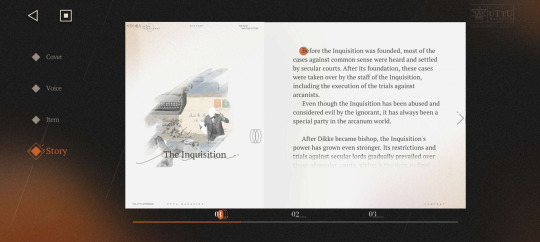
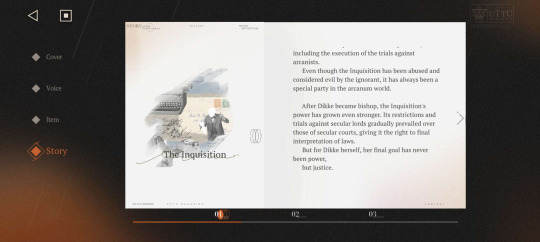
There is an emphasis on how the Inquisition seeks power, while Dikke's final goal is justice.
This whole thing and yet another part from her interview with Pandora Wilson, is related to how Dikke associates herself with the corrupt and allows people to view her as a needlessly violent person for the sake of setting things right. On one hand, she could associate with the Inquisition and become a bishop to destroy corruption from inside out - on the other, she could acknowledge that to impart justice, one needs power because they're things that go hand in hand. The Inquisition is only able to have this much influence over trials for arcanists because of the common hatred towards arcanists throughout history.
The interview revolves around all the rumours surrounding Dikke, and we can see her showing distaste at the idea of cooperating with "what [she] shouldn't allow for the sake of justice" while at the same time, not denying her involvement with them. All the things she does are a means to an end.
Pandora Wilson: Does that mean you will cooperate with what you shouldn't allow for the sake of "justice"?
Dikke: Fie.
Pandora Wilson: Is that supposed to be a secret?
Dikke: It sounds like we are talking about a conspiracy, yet it is but a means.
As for Dikke's own relationship with justice and her personal views outside of all the historical references used to create her character, I think this voiceline she has pretty much sums things up nicely.
Everything I doth… is so I may enjoy this calm wind on nights like this, rather than hear the sorrowful cries and moans of unhappiness.
She's a character that is strict in her ways and doesn't shy away from the darker aspects of life, such as the injustice arcanists have been subjected to for centuries. This extreme focus she has for upholding justice does cause Dikke to appear cold, and yet her ideals are almost childish, pure even - a world in which all misdeeds are punished and all good people are heard. Hell, her Ultimate literally purifies all negative statuses.
Dikke could easily lean towards righteous characters who exclusively see things as black or white, yet many of her voicelines and the origin of her devotion, show a very gentle heart. This is made clear by the fact that she's a healer.
Her two attacks and their names speak volumes about her own ways of thinking. Power is violent, power is not something that a judge should have so carelessly, but it is allowed in the name of "justice". Justice in quotations.
And then, actual justice is a rare occurrence, being merciful is not something that rules and the law take into account, but it's needed for those who cannot defend themselves.
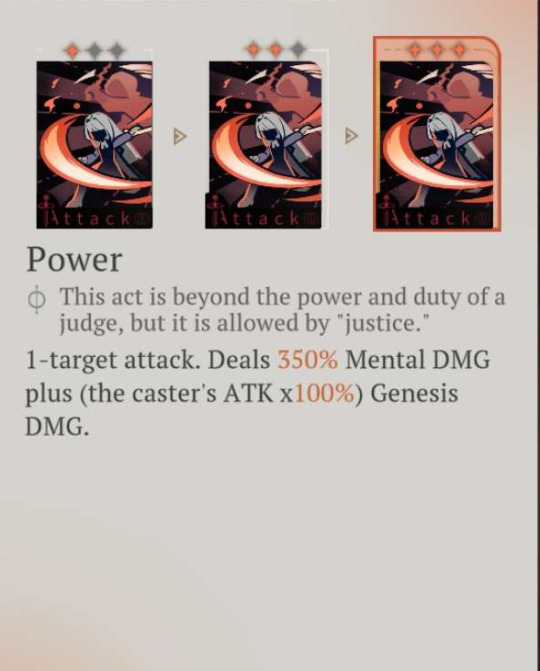

On the subject of Dikke's backstory.
There's no resolution to this point, it just came up randomly while writing the previous one, because it just hit me that Dikke's Cover profile does not list where she was born. And that got me thinking about the fact that before settling down, she traveled all around Europe.
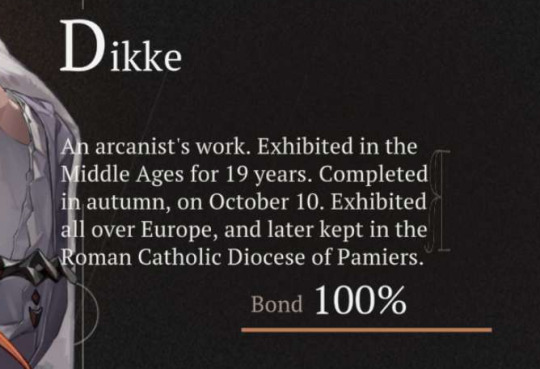
First of all, the Roman Catholic Diocese of Pamiers is an extremely specific location - one that has ties to the Inquisition, as a very important document regarding the Inquisition's procedures during a very specific trial was found there, as far as I know with my surface level research into history references. This document also talked about how, within this trial, the inquisitor and the bishop had "almost equal responsibility".
We can assume that this is the place where Dikke became bishop officially, if this was her final destination.
This starts to fall within headcanon territory, since it's mostly speculation, but I feel that the 02 Story takes place before she becomes bishop and settles in Pamiers - as a member of the inquisiton, she must've traveled all over Europe to do her job.
There might also be something related to the name mentioned, "Murville", but I don't have time nor the brain to start connecting the dots with actual french history. All in all, I like to think that Dikke was given the position of bishop as an attempt to distance her from, you know, killing every single corrupt person in a position of power by keeping her in a single place.
None of her voicelines give away anything about her life prior her entire journey of justice, as far as I can tell.
If we take Dikke's ties with Joan of Arc, maybe she was a common girl roped into things beyond her control. But I personally don't like the interpretation of Dikke's ideals being born from divine intervention instead of her own experiences, seeing the crimes committed against arcanists and realizing that she would like to do something about it.
Another option I'd like to explore about her background - maybe Dikke did have a relatively safe and normal childhood, away from the stigma and persecution. A nice, gentle life that she willingly gave up after she was confronted with the reality of the state of the world, without Jean of Arc's holy realization. To me, there needs to be an emphasis on Dikke's choice and decision to fight corruption. Making this dedication a result of "God told me to do this" would render her a little shallow - not to say religion cannot be part of her character, but in my opinion, Dikke is best when the focus of her moral compass is a genuinely care for the weak and the defenseless.
On the subject of Dikke and the loss of humanity.
Yes, that's THREE characters in a row that I analyze and that have themes of loss of humanity. There's just so many characters who've lost or given up their own humanity for the sake of something greater or something wicked.
Pavia's was a result of how he was mistreated and as a way to reclaim power, Forget Me Not's was a self-imposed torture originating from his inability to take responsibility. Dikke's seems to be self-imposed as well, but unlike the previous two, her loss of humanity is more of a sacrifice she makes for the greater good.
In her voicelines, we see that she leads a very strict schedule - she's straightforward and curt (but never impolite!) with Vertin, alluding to how simple justice is (if one commits a crime or abuses power, they shall be dealt with regardless of their social status) and how her body is "a representation of justice". Dikke has become a symbol for an idea, the concept of a fair system - she is no longer an individual but a savior, an executioner, a violent ghost, a witch, a threat, etc etc.
The loss of humanity is obvious in the way we do not get to know Dikke outside of any themes regarding justice. It's extremely hard to gleam any information about her childhood, her family, her interests and so on because they've all been displaced by this identity as justice itself. To me, this speaks about how power and responsibility on this scale will inevitably separate you from the people, THIS is the Sword of Damocles, now applied to Dikke as much as it applies to those in line for her judgement.
And yet, there are still very small hints of humanity left within her (still related, in a way, to her goals) in her care for the weak. Dikke's quote on her hobbies in a way reminds me of Sonetto.
The idle chatter of the people is entertaining, but 'tis more entertaining that they are always the first to know about the corrupt behavior of nobles.
Sonetto is a character that is similar to Dikke, in the sense that they both became the embodiment of concepts that ultimately stripped them off their individuality. Sonetto by fulfilling her training at the Foundation and becoming the PERFECT example of a military dog, a child martyr who struggles to connect with others because she was only taught how to exist FOR the Foundation. And Dikke, by all the things mentioned before.
But both of them have very endearing hobbies. Sonetto reads newspapers and collects them to find TYPOS IN THEM. Dikke's hobby is to listen to people talk as they go on about their day, not gossiping but to just listen to people exist.
In the main story, Sonetto's upbringing causes her to have a barrier with the people she truly wants to connect to (Vertin, namely) and Dikke's goal causes her life to revolve around a single thing, now only able to engage in mundane things from an outsider's perspective. She listens to people, she doesn't talk to them. She protects people, she doesn't live among them.
I like to think that, even so, this is when Dikke is most at peace. That she enjoys people watching, knowing they're safe and sound - because it validates all her efforts, it means that what she's doing is, in the end, worth it. This might also be why Dikke tells Vertin that they might be on the same path - Vertin, slowly figuring out the truth behind the Foundation and Manus Vindictae and acting as a saviour for those stuck in the middle.
As for headcanons, here's a couple I have!
Dikke has such a dry and deadpan sense of humour that only Vertin can understand it.
Sometimes, very rarely, Dikke will chime in with the most outlandish reply - straight out of the blue, spoken in the most serious and monotone voice. Those who aren't close to her will most likely brush it off as yet another intimidating thing they can't understand about her, but those close to her like Vertin?
It's THE funniest shit in the world and Dikke, who is very aware of the image and respect she commands, knows it.
Dikke and the artifact that follows her are friends.
Quite literally, that thing is the hand of justice. I like to think that Dikke can communicate with it non-verbally, even though it's implied that the artifact is not created by her arcanum.
Part of me likes to think that Dikke insists on said artifact being just her partner in her long journey of bringing justice to the world, but due to all the years spent together and all, the artifact itself (and whatever entity that shows up in her Ultimate) have come to see Dikke as their protégé.
#reverse 1999#reverse: 1999#reverse 1999 headcanons#reverse 1999 dikke#dikke#yes im flexing my 100% bond with her in that screenshot#i only have 3 characters at max bond and its pavia zima and dikke LMFAO
74 notes
·
View notes
Note
Hcs for how a rivalry (romantic) would happen between Connor and his superior model RK-900? Thank you!
Sure! This takes place in an AU where Connor deviates upon knowing he's being replaced and is on the run from Cyberlife.
I'd like feedback as I had so many ideas for this, I want to know how I did! Hope you like it :) This could totally be a longer fic due to the endings ans choices. I'm so happy with this.
Ngl, new fav fic of mine. This is long. I need to write more D:BH.
Yandere! Connor (RK800) vs RK900
Pairing: Rivalry - Romantic
Possible Trigger Warnings: Gender-Neutral Darling, Obsession, Kidnapping, Guns, Murder, Forced kissing, Possessive behavior, Moral conflict, Rivalry, Deviancy, Android/Human, Overprotective behavior, Blood mention, Stalking, Invasion of privacy, Trauma.
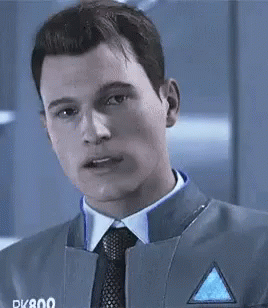
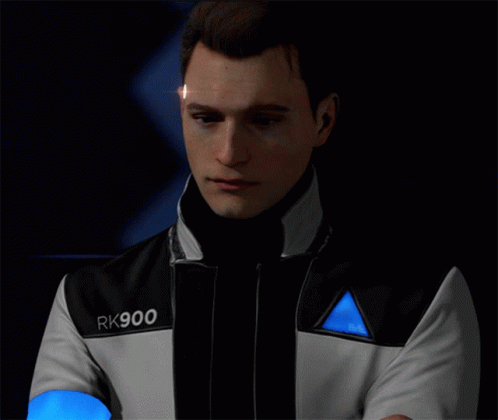
You knew Connor first
The android was cold at times but you knew he was just doing what his programming told him.
You worked at the police station, while Connor was assigned to Hank, the android often looked towards you.
It was against his programming to ask about you, yet you still saw him walk over to you.
You weren't opposed to androids unlike your colleagues, yet you didn't want to encourage Connor to be off task.
"Hello, Officer (Y/N)."
"Hey, Connor. Need something?"
"No. I was just checking in. Are you doing fine with organizing crime files?"
"Yes... but you should really go back to Hank, Connor."
"Do you not like me standing here?"
"I just don't want to distract you, Connor."
"I am not on duty as of now. Do I make you uncomfortable?"
This Connor is a combination of sticking with his coding and being a deviant.
He's deviant enough to still have some sort of obsession towards you, but cold enough to go against other deviants.
You have no idea how you affect the android.
You bring out the flaws within him.
The flaws that push him to looking for info about you.
When you aren't around, Connor snoops.
He looks through your computer for the most part.
It would be strange if he asked others about personal info.
He also isn't deviant enough to stalk.
Then, once Connor completes his missions, you meet RK900.
It surprises you when you meet the newer model, he looks exactly like Connor but with different clothing.
This leaves you dreading what happened to Connor....
"What happened to Connor?"
"RK800? He is being hunted by Cyberlife. In short, he is on the run."
"On the run...?"
"Yes. I have been assigned to Lt. Hank Anderson... Cyberlife told me you are also on the case. The uprising is finished. We just need to find RK800 now."
Something about the way RK900 talks puts you on edge.
Connor ran away? So he was a deviant....
It saddened you to know he probably ran due to the fear of being replaced....
No one likes to be replaced, human or android.
This is how RK900 gets attached to you.
He is aware you were close with the deviant, thinking you'll be the key to finding him.
He is a better model of RK800, meant to iron out the imperfections of his predecessor.
Although, turns out they missed one or two.
While not as open about it as Connor, he still feels an attachment towards you.
Through the hunt of Connor, RK900 appears to care more and more about you.
He also keeps trying to convince you Connor's dangerous.
"If you see the deviant, contact me."
"You mean Connor-"
"The name is not needed. Promise you'll call for back up."
"Fine... I promise."
You have no idea that when you're with RK900, Connor is keeping an eye on you.
Finally full deviant, Connor stalks you and his replacement.
It hurts him to know you were stuck alongside someone who looks like him... but isn't him
Connor is now without his LED, body covered in a large hood and baggy pants.
He needed a disguise that would hide his appearance... this is what he could come up with.
He doesn't look like the Connor you used to know.
He looks a bit too human.
He never wanted to be on the run, yet he never wanted to be replaced either.
In fact... he wished he could have you on the run with him.
It would be unsafe, but he really misses you.
Watching you with that RK900 upsets him, too.
Perhaps during the investigation, when RK900 finally leaves you be, Connor pulls you into an alleyway.
You go to scream... but those eyes are familiar.
"Don't say anything. I promise I won't hurt you."
"Connor? Is that really you?"
"I missed you, (Y/N)... Truthfully, I think of you a lot."
"That's... flattering- What is your plan? Are you going to run until your thirium pump stalls?"
"I want to get out of the city... you need to come with."
"... Connor, no, I-"
"Please, (Y/N). I promise we'll live a good life. Just help me-"
"...."
You're left with two choices.
Go with Connor and help him out of the city or stick with RK900 to turn Connor in.
>>> Leave with Connor.
"Fine, I'll help you out."
If you agree to Connor's offer, he's ecstatic.
Unable to control his fabricated form of love, he leans down and kisses you.
His lips are cold, a faux sense of desperation in his movements.
He then pulls away, readjusting the hood.
"I knew you'd say yes."
You then disappear with Connor, alerting RK900.
You were done investigating your area, right?
Why weren't you back?
The chase for Connor intensifies, now realizing you're gone too.
You're now suspected of helping the deviant, your arrest now being thought of.
Connor's grip on you is intense.
He's extremely protective of you and you help him try to leave Detroit.
When escape is within your grasp, RK900 stops you both.
"Connor, look out!"
A gunshot is heard, thirium spilling out from Connor's hood.
"RK800. Release your hostage!"
RK900 has a gun pointed at Connor, meanwhile Connor has you behind him.
"(Y/N) is no hostage.... we're happy!"
Connor pulls a gun from his pocket, pointing it at RK900.
"Back up is on its way, RK800."
You look fearfully between the two.
This could end one of two ways....
>>> RK900 shoots first
"No... leave us alone- I refuse to comply."
"You leave me no choice, RK800. You'd be disassembled anyways."
With quick speed, RK900 shoots Connor between the eyes.
You scream as the deviant hits the ground, RK900 pocketing his gun.
"Now listen, (Y/N). Your arrest is being considered. However, if you come with me with the explanation you're a hostage... you'll be fine. If not... a cell is waiting for you."
You stare warily towards Connor, deactivated on the ground.
Dead upon the head wound.
"... If you say so...."
RK900 then takes you into his hold, walking you back to the station.
"You know..."
RK900 starts, gray eyes looking towards you.
"If you wanted attention from him, I could give you just that."
Your eyes widen, staring up at the android.
It clicks in your head once you get to the station...
He's a deviant too.
>>> Connor shoots first
Before giving RK900 a chance to speak, Connor shoots.
A bullet hits his neck, then another in his head.
In retaliation, RK900 shoots but it misses you both.
Damaged on the ground, RK900 lays motionless.
"Okay, Connor, let's run-"
*Bang bang bang*
Connor shoots three more unneeded rounds into RK900 before tugging you along and pocketing his gun.
"Come on."
His tone is cold once again, pushing you two on a bus heading out of town.
Connor sits you by a window seat and him next to you.
You're caged in, Connor's brown gaze fixated on you.
"(Y/N)."
You look to him, the situation setting in.
"... Can we kiss again?"
"Connor... why?"
"I like to think... I'm yours. So, please, show me I am."
"... if you really want it"
It'll be a long bus ride... you aren't even sure if this is the right decision in the end.
>>> Refuse Connor's offer.
"No, Connor."
He looks to process the information before pressing you closer against the wall.
"I NEED you, (Y/N)!"
Cold lips force themselves against yours, silencing your screams for help.
That is until a gunshot is heard, thirium pooling out of Connor.
"Release Officer (Y/N), deviant."
RK900 points a gun towards Connor, Connor pulls away, pulling a gun of his own.
"No..."
This could end one of three ways.
>>> RK900 shoots Connor
"Very well then, RK800."
*bang*
Connor lets you go, crashing into the alleyway.
You flinch at the loud sound, RK900 putting away his weapon before coaxing you close to him.
He notices you shaking, eyes narrowing at the damaged deviant.
"It'll be okay, (Y/N)... I've got you. I'll protect you."
Normally, he'd ignore your shaking hug.
Although...he felt different.
The obvious culprit would be deviancy.
Which would mean memory wiping... or worse.
RK900 silences such thoughts and decides to hide them from you, for now.
You may not be emotionally stable enough to handle it, anyway.
RK900 presses you to his chest, chin on your head.
He'll comfort you... then take you back.
After removing Connor... RK900 felt... relief.
Was it because you're no longer in danger...?
Or was it because you're finally all his?
>>> Connor shoots RK900
"I'd never give (Y/N) up."
*bang bang bang*
RK900 is caught off guard, falling to the ground.
Connor then holds you crushingly close to his body, making a run for it.
Even though you struggle, he ignores it, throwing you over his shoulder.
You'll understand he cares for you in time...
For now, he needs to focus on getting you both out of town.
"I know you don't understand, (Y/N)... but I'm yours, and I hope you'll be mine.
In this case, while it ends similarly to the "Accept Connor" choice...
You really are a hostage this time.
>>> Connor shoots you
"If I'm leaving... then (Y/N) is too."
"Connor, what!?"
The barrel is pressed against your head, the cold metal freezing your skin.
"(Y/N)!"
*bang bang*
Gunshots sync together, leaving only one android active.
You lay on the ground, gunshot to the head taking you out.
Connor lays next to you, shot to the head damaging his processors.
His embrace is still tight around you.
RK900's LED flickers yellow, scanning what has occured.
It then went red at the realization of your death.
RK900 was speechless.
He called your name in concern... admitting deviancy.
He also felt... angry, remorseful at your death....
He was a deviant too... he could sense it.
But what was the point?
He didn't need to be deviant for anyone now.
"What happened, RK900?"
Hank asks, RK900 turning around.
"I was unable to recover Officer (Y/N). Our deviant is disabled, however."
"Dear god...."
RK900 looks back at you, LED continuing to flicker.
In his mind, his mission failed.
435 notes
·
View notes